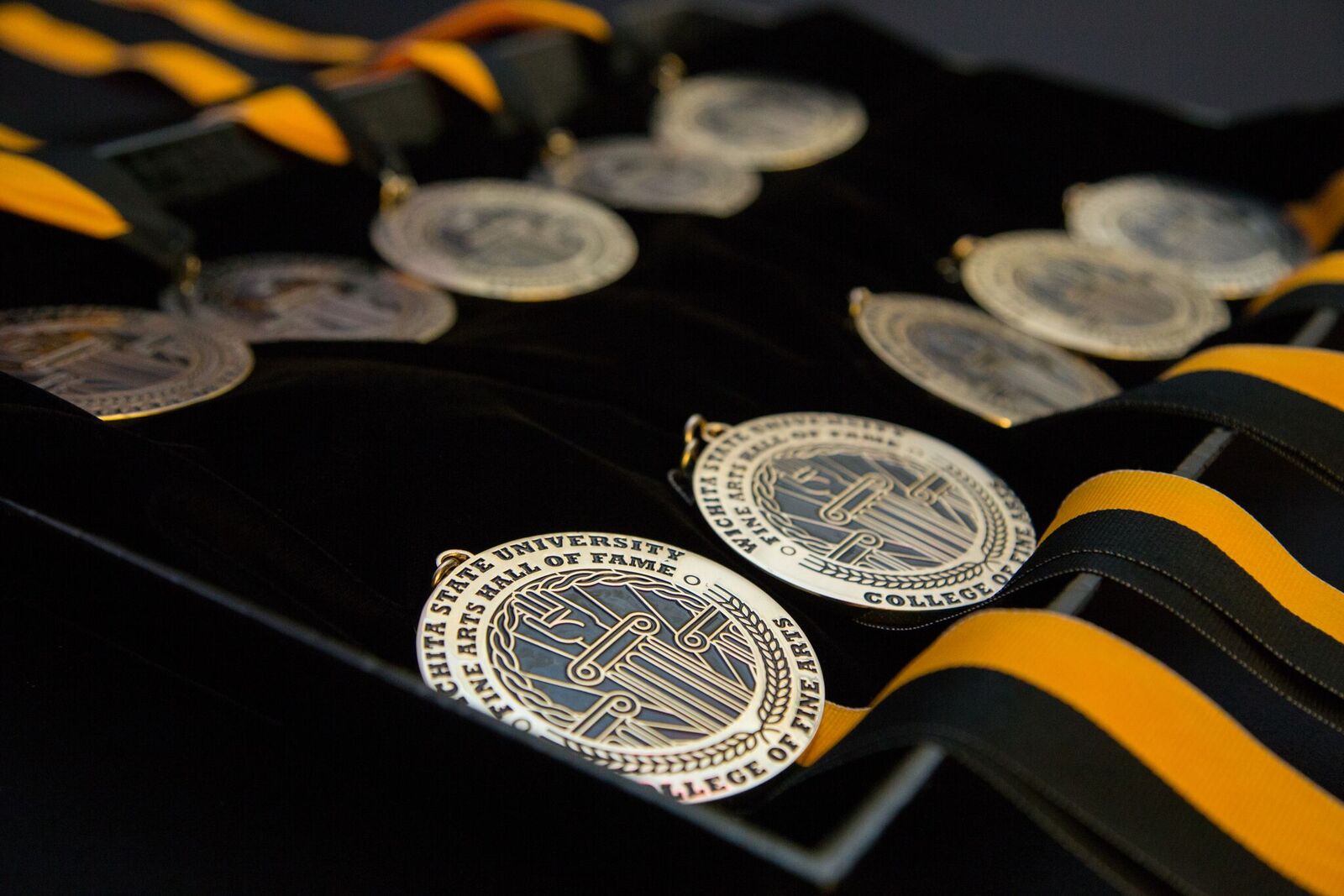

Wichita State University's College of Fine Arts Hall of Fame is re-envisioned to recognize individuals who have impacted any discipline in our programs: Art, Design and Creative Industries, Digital Arts, Music, and Performing Arts. The focus of the Hall of Fame event will be to recognize alumni as well as include a student engagement component. This award will be presented to alumni.
The College of Fine Arts (CFA) defines alumni: it originates from the Latin word "alumnus," which means "foster son" or "pupil." The root of the word comes from the verb "alere," meaning "to nourish" or "to bring up." The term has evolved to encompass not only graduates but also former members and contributors to an institution, reflecting a broader sense of connection and community beyond just academic achievements. Consequently, the CFA will honor individuals who have made significant contributions to the fine arts, regardless of whether their degrees were obtained from the CFA.
There are no specific categories for nominations; instead, the CFA is embracing an open-ended format to better serve and engage a wider community.
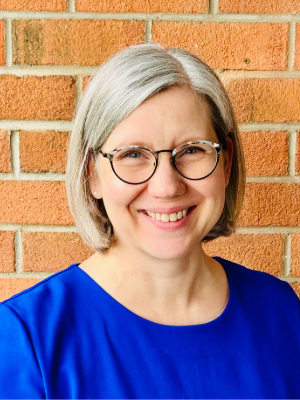
Bikki, a proud Wichita native, has cultivated a global perspective through extensive travel, fostering a deep appreciation for arts, culture, and community engagement.
Bikki’s passion for travel and seeing new places started at age six when her parents took her on a three-week road trip from Kansas to Maine. Her parents believed in the educational value of travel and sent her on trips to visit family across the country and the common high school tour of Europe. This early exposure to diverse places, people, and perspectives laid the foundation for a lifelong curiosity about the world.
To date, Bikki has traveled to forty-nine states and almost thirty countries for both personal and professional reasons. Among her most memorable journeys are a college summer spent in Sweden, visits to Australia and China, a cruise around Cuba, a Jane Austen themed trip to England, and visiting almost all the MLB stadiums (to be completed this summer).
With over 25 years of professional experience, Bikki has held pivotal roles in internal audit and corporate services, making significant contributions on operational efficiency and strategic growth. In recent years, Bikki has taken on leadership positions in human resources and facilities management for diverse international corporations, demonstrating her adaptability and effectiveness in complex, dynamic environments.
Bikki's commitment to not-for-profit service is exemplified by her roles supporting two local collegiate chapters of Phi Mu Fraternity, as a trustee of the Central New Jersey Alumnae Panhellenic Foundation, as a member of the Wichita State National Advisory Council and the Ulrich Museum of Art Advisory Board.
Bikki holds a Bachelor of Business Administration (Magna Cum Laude) from Wichita State University and a Master's in Human Resource Development from Villanova University. She is a certified HR professional (SPHR).
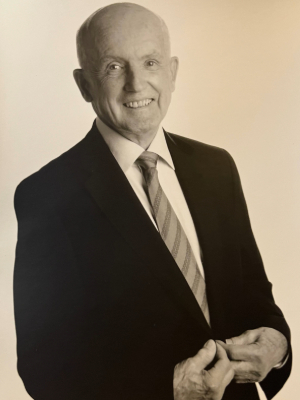
Martin H. Bush was an influential art historian, educator, consultant, and gallery director who played a pivotal role in shaping the artistic landscape of Wichita State University (WSU) and beyond. He received his Bachelor of Arts from the State University of New York at Albany and his PhD from Syracuse University.
In 1971, Bush began his 20-year tenure at Wichita State University, first as Assistant Dean for Academic Resources and then as Vice President of Academic Resource Development. During this time, he was instrumental in establishing and developing the university's art museum and collection, which would later gain national recognition. Under his leadership, the Edwin A. Ulrich Museum of Art was founded in 1974, enhancing WSU's educational and service missions.
One of Bush's most significant contributions was the creation of the Martin H. Bush Outdoor Sculpture Collection at WSU. Established in 1972, this collection has become a world-class assortment of 86 works spread across the university's 330-acre campus. The collection features pieces by renowned artists such as Sofia Vari, Henry Moore, Louise Nevelson, and Andy Goldsworthy, among others.
Bush's vision extended beyond the university campus. He believed in making art accessible to the wider community, aligning with then-president Clark Ahlberg's philosophy of serving the urban area with the highest artistic standards. This commitment to public art has made the Outdoor Sculpture Collection one of Wichita's most significant cultural attractions.
Throughout his career, Bush was involved in various aspects of the art world. His papers, held by the Smithsonian Institution, document his work as an art historian, educator, consultant, and gallery director from 1948 to 2012. These materials, including correspondence, interviews, and other documents, provide insight into his extensive contributions to the field.
Martin H. Bush's legacy continues to influence the artistic and cultural landscape of Wichita State University and the surrounding community. The outdoor sculpture collection bearing his name stands as a testament to his vision and dedication to bringing world-class art to public spaces.

Alan and Sharon met in 1968 at Wichita Heights HS in a sophomore English class. Although they knew each other and ran around in the same nerdy crowd they did not date and each went their separate ways for many years.
Alan attended Wichita State graduating in 1975 with a degree in Chemistry. His Senior paper, titled “FSGO Calculations of Geometries and Electronic Structures of “Argon-Core” Third-Row Hydrides,” was co-written with Erach R. Talaty and Gary Simons.
He decided during high school that he wanted to be a physician when he saw how his family’s doctor took such personal care of his mother when she had a heart attack. He applied to, and was accepted, at KU Medical Center. To cover his expenses, he enlisted in the Air Force and paid them back by serving year-for-year. Since KU was trying out a year-round medical school, Alan only served in the Air Force for three years assigned to Kirkland AFB in Albuquerque, NM. He enlisted as a Captain and was promoted to Major shortly before leaving the Air Force.
Their first child, Alana, was born during this time. Sharon volunteered for the Red Cross, refinished furniture, volunteered for the Officer’s Wive’s Club and played lots of bridge. The Feareys also traveled around New Mexico and started collecting indigenous art from the pueblos in earnest.
In 1984 they moved back to Wichita to be close to their parents and because they wanted to buy an old house to rehab. They bought their 3700-sf fixer-upper in late 1984 and their second daughter, Laura, was born in April of 1985. They not only rehabbed every inch of their 1915 home while raising their two daughters but also became very involved in neighborhood issues the oldest area in Wichita faced. They helped save several other houses in the area and worked with the city to help maintain and improve the neighborhood. In 2024 they moved to the 2nd floor of a downtown building that they own. And, yes, they love living downtown.
In 2000, Sharon was one of the two lead community volunteers in getting the USD 259 bond issue passed. Realizing that strong schools make strong cities and vice versa, she decided to run for the open 6th District City Council seat in 2001. Joan Cole, Sharon’s mentor, was a strong advocate of public art and taught Sharon much about the arts in Wichita. Through this, Sharon and Alan both served on the Wichita Arts Council and were instrumental in implementing the Sculpture Walk-About in Old Town and at the Intrust Arena. They also supported the Ulrich Museum with Alan serving on the Board. Sharon put together a power-point of art throughout the city – including much of the outdoor sculpture at WSU – and presented it to various groups. They supported the rehabilitation work on the Joan Miro sculpture along with the Music Associates and the Art Angels.
The Feareys remain involved in the arts through their personal collected, continued support of the Ulrich and supporting the Wichita Art Museum, Music Theatre, and the Wichita Symphony. They are currently heavily involved with the auditorium rehabilitation at the 1922 Orpheum Theatre. Sharon served 9 years on the Orpheum board and continues on their Facilities Committee and their Capital Campaign Leadership Committee. They have also made personal gifts for the rehab effort.
Alan and Sharon are a couple that strive to make their community better for everyone and deeply believe that you can’t do that without everyone having the opportunity to be surrounded by beautiful art.

Javier Ignacio, a New York City-based performer for nearly 20 years, is renowned for his portrayal of Harry Houdini/Dog Boy in the 2014 Broadway production of Side Show and as Peter in the First National Tour of Company in 2023. He also served as an understudy for the roles of Jamie, Peter, and Andy in the 2021 Broadway production of Company, which starred Patti LuPone and Katrina Lenk.
Javier was born in Caracas, Venezuela, and was inspired by his singer-songwriter grandfather and his opera student and speech therapist mother. After moving to Wichita, Kansas, his love for music grew, and he was exposed to the arts scene at Music Theatre Wichita. He trained at MTWichita and Wichita State University before moving to New York City.
Javier's regional theater credits include performances at The La Jolla Playhouse, The John F. Kennedy Center, Actor’s Playhouse, The Asolo Rep, and MTWichita. He has also developed new works, such as Children of Salt at NYMF, and performed in Shakespeare’s Twelfth Night at Classic Stage Company and Shakespeare in the Park.
Javier starred as Johnny Cipp in the award-winning short film Pretty Flamingo, which won Best Proof of Concept at the NYLIFF in 2023. His bilingual skills have also led to voiceover work for commercials and public service announcements. As an immigrant and a member of the LGBTQ community, Javier hopes to inspire future generations to pursue their dreams fearlessly and authentically. Whether on stage, on screen, or behind the mic, Javier brings passion, dedication, and authenticity to every performance.
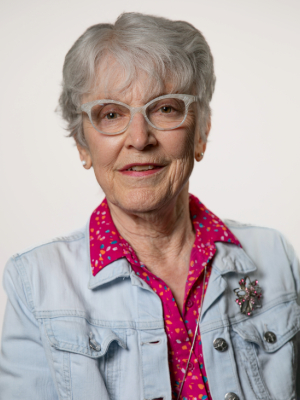
Known as an educator, musician, performer and director for over 40 years, Linda Starkey is a prominent figure in the arts at Wichita State University and the Wichita community. Starkey’s educational background includes a BME from the University of Kansas and Masters’ degrees in Voice (Fort Hays State University) and Theatre (WSU). She began teaching at WSU in 1980 as an adjunct professor in the School of Music teaching voice lessons, directing the Chamber Singers and assisting George Gibson with opera productions and Bud Boughton with the Renaissance Feasts. During this time, she also became involved in WSU Summer Theatre where she worked with Dick Welsbacher, Mary Jane Teall, Audrey Needles and Joyce Cavarozzi serving as Music Director and/or Stage Director for over 200 productions. She moved to a full-time position in School of Performing Arts in 1997 with the development of the Musical Theater Degree and continued to provide guidance and support for building that program. She became Director of the School of Performing Arts in 2009 and served in that capacity until her retirement in 2022.
Throughout her career, Starkey has made significant contributions to music theater education. In 2016, she received the Golden Medallion from the Kennedy Center American College Theatre Festival, one of the most prestigious awards in the field, highlighting her expertise and impact in this area. She received the College of Fine Arts Excellence in Creative Activity (2005) for her work in directing the production of Pippin that was featured in the Kennedy Center American College Theatre Festival in St. Louis.
Her work in the Wichita community included 15 years with Music Theatre Wichita where she served as Music Director for MTW’s Teen Choir. She directed and/or performed with many performing arts organizations in Wichita including Opera Kansas, Cabaret Oldtown, the Forum Theatre, Wichita Center for the Arts and the Crown Uptown Dinner Theatre. She received the Outstanding Educator Award from the Mary Jane Teall Hall of Fame in 2018, received 2 Wichita Arts Council Awards: Outstanding Arts Organization for MTW Teen Choir (2014) and the Burton Pell Achievement Music Award (2006).
Since her retirement from WSU, she has continued to be an active presence in the arts including Music Direction for shows at the Forum Theatre, teaching classes for Lifelong Learning at WSU, serving on the WSU Retiree Association Planning Committee and serving as President of the Performing Arts Angels. She remains passionate about teaching and the power of the arts to transform lives.
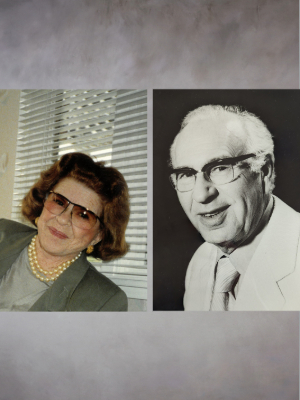
patrons
Sam Bloomfield was considered one of ‘Wichita’s aviation pioneers.’ Educated in the United States, Switzerland and Germany, he received his degree in aeronautical engineering in 1929, graduating with highest honors. Rie Bloomfield was born in Henryetta, Okla., in 1909. She received a degree in nursing from Wichita Hospital, now Via Christi St. Joseph campus, and practiced as a registered nurse until her marriage to Sam.
The Bloomfields lived in Wichita from 1934 to 1956. Relocating to California, they remained connected with the Wichita community, including the Wichita Symphony Society, Wichita Center for the Arts, and, of course, Wichita State University.
In 1994, the Sam and Rie Bloomfield Foundation established an endowment for the fees of artists performing in WSU’s annual organ series. Since that initial endowment, the Foundation has continued to support WSU artistic and cultural endeavors, particularly in music.
At the series’ dedication, former WSU President Eugene Hughes said, ‘Rie, you have planted many flowers here at Wichita State, and endowing this organ series is but one more Bloomfield flower to grow on our campus.’
Through the Bloomfield Foundation, the Bloomfields assisted in the completion of Wiedemann Hall, which houses the Marcussen organ, as well as several of the Bloomfield’s personal collection of paintings and sculptures.
In addition to the Fine Arts, the Bloomfield Foundation has supported endowed funds in Engineering and Business. The current trustees seek to continue the legacy of Mr. and Mrs. Bloomfield through their focus on educating and inspiring WSU students and faculty toward excellence
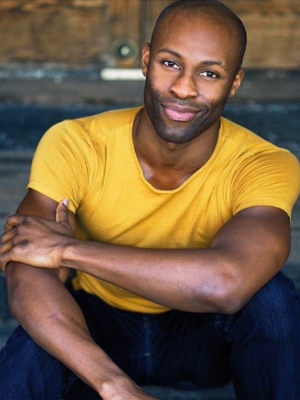
alum
Taurean Everett, son of Victor and Junetta Everett, discovered a passion for athleticism and artistry after excelling in both theatre and competitive all-star cheerleading in high-school and college. In 2008, post-graduation, Everett moved to New York City with a dream of seeing his name in the lights. In 2014 when Everett landed his first Broadway show, Mamma Mia!, he quickly learned that performing nightly on Broadway was very mentally and physically difficult. However, drive, ambition, determination (and a slight competitive streak he got from his father) eventually led him to three more Broadway shows (to date), and many other notable performance opportunities.
Taurean’s Broadway credits include Moulin Rouge!, The Cher Show, Miss Saigon, Mamma Mia!, and the national tour of Priscilla, Queen of the Desert. He’s made multiple appearances as a runway model on Bravo’s Project Runway, and is a featured performer on Peacock’s The Amber Ruffin Show. He’s performed on the nationally televised Tony Awards, and in 2019 made fashion history at the Met Gala accompanying superstar Billy Porter. When he’s not onstage, he is involved with NYC public school theatre programs that provide Arts education to inner-city students. From 2020 to 2023, he was involved with the WSU SPA Inclusion, Diversity, and Equity Alliance (IDEA), an organization focused on creating a more balanced, accessible college experience.
His future goals include seeing himself on a billboard in Times Square as a Calvin Klein underwear model, and becoming a Marvel Movie Universe character. “Overall, I want to be a light for others, an example for dreamers, and I want to make my family proud. BElieve in YOUrself,” he says, “and that’s all there is to it.”
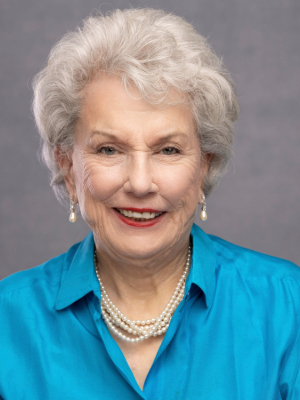
mentor
Mary Sue Foster earned three degrees from the University of Kansas, taught and directed the art education program at Wichita State University between 1966 and 2017. She served in leadership positions in organizations for art teachers, organized thirteen summer art education institutes, worked to give recognition to successful artists by curating an art exhibit by women only, she made two extended trips to Japan to study how their ideas have impacted our art curriculum and vice versa.
During her career at WSU, Mary Sue served on executive boards of organizations for art teachers at the state and national level. She was elected President of the Kansas Art Education Association, followed by vice-president of the National Art Education Association, serving on both executive boards more than a decade.
Thirteen summer art education institutes for teachers were coordinated by Mary Sue Foster. She brought art education authors to Wichita to lead discussions about campus sculptures and selected pieces in the Wichita Art Museum’s collection. Promoting artists and educating others in the looking experience resulted in Mary Sue co-curating a traveling exhibit of art work by 42 women in 1974 which opened at Century II. Viewers were invited to interact with the art pieces in a game-like format. An art exhibit for women only was unusual for the time. In 1964-66, she taught in the Creative Arts Program at the Nelson-Atkins Gallery of Art in Kansas City, MO.
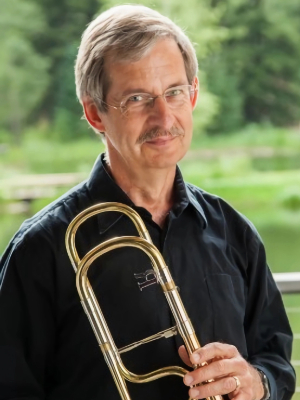
alum
Michael Powell is one of the most sought-after trombonists in New York City. Since 1983, Mr. Powell has been a member of the celebrated American Brass Quintet. He performs and records regularly with the Orchestra of St. Luke’s, the Orpheus Chamber Orchestra, and the Little Orchestra Society. Mr. Powell has performed as a soloist with the Orchestra of St. Luke’s, the Kansas City Philharmonic, the Aspen Music Festival, and the New Hampshire Music Festival. He also records for radio, television, and cinema and has appeared on over sixty recordings as a trombonist.
He frequently appears with such diverse ensembles as the Chamber Music Society of Lincoln Center, Speculum Musicae, The New York Chamber Symphony, the Zankel Band of Carnegie Hall, Music Today, Musical Elements, the Classical Band, Professor Peter Schickele’s New York Pick-Up Ensemble, and Tidewater Quintet. From 1978 to 1982 he was the principal trombonist of the Kansas City Philharmonic. Mr. Powell has commissioned, premiered, and recorded solo works by Eric Ewazen, Robert Martin, Steven Sacco, and David Sampson. He is on the faculties of The Juilliard School, SUNY at Stony Brook, and the Aspen Music School.
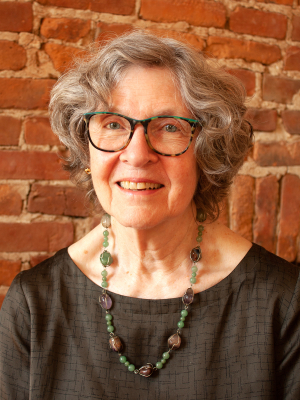
alum
Mary Joan (Dawson) Waid was born in Kansas and graduated from Wichita University in 1961 with a Bachelor of Fine Arts degree. At Wichita, she met and married Guy Crandell Waid, a baritone studying classical voice in the School of Music. After graduation, they moved to New York City. With their two young sons, Bruce and David, they settled in the late 1960s in SoHo, then an industrial loft district in lower Manhattan where artists were creating a new community. During these early years, Waid’s studio practice focused on domestic observations.
In 1973, Waid became the registrar at the Andre Emmerich Gallery, which was well known for exhibiting such artists as Hans Hofmann, Helen Frankenthaler, Kenneth Noland, Al Held, and Adolph Gottlieb. While she retained the closely observed light and color of her still life subjects, her paintings began to reflect her immersion into an environment based on abstraction.
In 1977, Waid mounted her first solo New York exhibition, at the Fischbach Gallery. In addition to fourteen more solo exhibitions in New York, her work has been shown in galleries and museums across the United States as well as in Germany, Switzerland, and Japan. She was awarded four residencies at the art colonies Yaddo and MacDowell.
Waid’s paintings are in numerous private and public collections, including those of the Art Institute of Chicago, the Indianapolis Museum of Art, the Minneapolis Museum of Art, the Wichita Art Museum, and the National Academy of Design. Her work can be seen at the Atrium Gallery, in St. Louis, Missouri. She lives and works in New York City and Vermont.
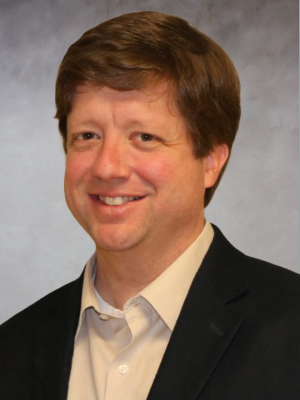
alum
Shawn Chastain is in his 14th year as Executive Coordinator of Fine Arts for the Wichita Public Schools, supporting 300 dedicated faculty members who instruct over 30,000 incredible students enrolled in WPS Fine Arts Programs. During this time WPS Fine Arts has received over $30 million in Bond-Issued Fine Arts Facility Upgrades, been awarded over $5 million in National, State and Community Foundation Grants and named one of NAMM’s Best Communities for Music Education in 2013,’14, ’16 & ‘20.
Prior to this position, Shawn spent 15 years in the choral classroom at Wichita’s Charles Curtis Middle School and Heights High School. While at Curtis and Heights, Chastain’s choirs consistently received superior ratings at league, district and state festivals. His select ensembles were also awarded exemplary/best-in-class at festivals in Dallas, San Antonio, Breckenridge, Branson and Chicago. As Director of Choral Music/Fine Arts Department Chair at Heights, Chastain oversaw a 250+ member vocal music department that received the Senseney Music/KAKE TV “High Note Award” for musical excellence. Chastain earned his Bachelor’s and Master’s degrees from Wichita State University where he was a Presser Scholar, Senior Honor Man, Homecoming Royalty Court Designee, Brennan Scholarship Hall President, Brennan Hall Community Association President and Mortar Board Committee Chair.
In addition to his educational responsibilities, Shawn recently completed his 20th Year as Music Coordinator/Adult & Youth Choir Director at Wichita’s Calvary United Methodist Church, 19th season as Director of the Wichita Choral Society (Wichita’s Community Chorus, founded in 1945 by WSU’s Dr. Harold Decker) and 9th Season as ARISE (African Americans Renewing Interest in Spirituals Ensemble) Choral Director. Shawn has also directed WSU’s Kodaly Certification Adult Choral Ensemble and the Sedgwick County Jail’s Men’s Ensemble. He is a longtime choral clinician and adjudicator throughout the state and has conducted at KMEA four times.
Shawn is past president of the Kansas Choral Directors Association, WSU’s Fine Arts Advisory Board/Friends of Fine Arts, and immediate past chair of NAfME’s Music Program Leaders Advisory Council. While serving as the National Music Program Leaders Chair, Shawn helped coordinate NAfME’s inaugural Music Program Leader’s Summit – now an annual workshop bringing Music Program leaders across the country together for Professional Development and Networking. In the Summer of 2005, Chastain was selected as one of 15 educators in the United States to participate in the Fulbright German-American Teacher Linkage Program.
Shawn has received the Outstanding Administrator Award from the Kansas Art Educators Association, Kansas Music Educators Association and Midwest Kodaly Music Educators of America. Currently, Shawn also serves as Wichita Arts Council Education Committee Chair, Ballet Wichita Board Member, Arts Partners Program Committee member, Wichita Arts Forum member, and Education EDGE Fine Arts Gift Fund Chair. Shawn resides in NE Wichita (not too far from WSU) with his wife Debbie (Educational Therapist @ Trinity Academy), and children, Lindsey (WSU Senior), Eric (WSU Tech Freshman) & Elsie (HS Sophomore & potential Shocker!)
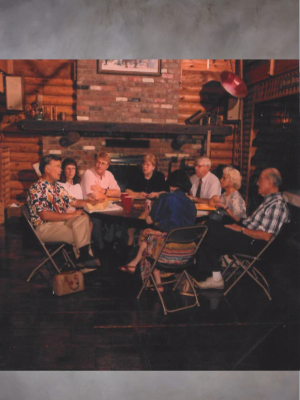
patrons
Music Associates was founded in 1993 to support the Wichita State University School of Music. Since then, community members have been pooling their financial resources into a single fund dedicated to aiding students within the School of Music. Members of the organization range from School of Music alumni who want to give back to the university that shaped them, to music enthusiasts who enjoy supporting musicians in the Wichita community.
In 1993 Harold Popp, then chair of the School of Music, with the approval and support of the Dean of Fine Arts and the WSU Foundation, organized a small group of alumni, headed by Denny Senseney, who was the first president of the organization, into the original founding board of the organization.
Members of Music Associates share one common goal—enhancing opportunities for Wichita State University music students. Their gifts mainly fund scholarships, but they also fund trips to perform across the country, bringing guest artists to campus, and sending students to symposiums. Without Music Associates, students would not be able to partake in these experiences that prepare them for successful careers after graduation.
At the end of December 2019, Music Associates passed the $1 million milestone in donations received since 1993. Thanks to the group’s hard work, we are able to maintain the tradition of musical excellence at Wichita State University.
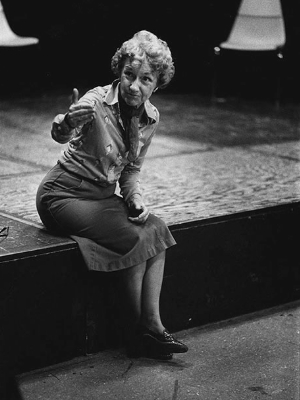
mentor
The name Mary Jane Teall was synonymous with theater in Wichita for more than 40 years.
As a child, Mary Jane Houston used to stage circuses and other shows on her grandfather's lawn in Tekamah, Nebraska, charging 2 cents admission and even building the plank seating out of lumberyard scraps.
Teall went on to study theatre at Northwestern University in Evanston, Illinois in the 1930s and directed GI productions during World War II. In 1945, a single parent, she came to Wichita to lead a teen club for an organization called Community Chest. Soon after that, members of her church, the First Unitarian Church, persuaded Teall to direct one-act plays in what was called the "Unitarian Experimental Theater."
By 1946, the one-act plays had quickly evolved into the Wichita Community Theater, where she was the guiding light and driving force for 43 years. Teall has acted, directed, sold tickets, collected and fabricated props, handled publicity, and dealt with budgetary problems.
She would soon become the “First Lady of Wichita Theater.” In addition to co-founding the Wichita Community Theatre, she served as professor of speech and drama at Wichita University. Retiring from WSU in 1982, as associate professor emeritus of speech communication and theatre, she would return to WSU each summer to direct the summer theatre program. In 1989, she resigned from WCT after 43 years, but continued her “Commedia” comedy revues and produced a number of shows with the Center Theatre for Young Audiences.
A diminutive, yet highly energetic woman, she was considered to have “created theater in Wichita,” and in 1981, was inducted into the Kansas Theatre Hall of Fame.
In 1989, the theater at Century II was renamed in her honor and dedicated as the Mary Jane Teall Theater. A plaque placed on the wall below a portrait of Mary Jane Teall in the lobby reads as:
Named in honor of the extraordinary Mary Jane Teall, whose 43 year contribution to local theater as founder and director of the Wichita Community Theater and as Assistant Professor and Director at Wichita State University, exemplifies the highest quality of community service.
Teall died October 13, 1994, from injuries she suffered in an automobile accident on her way to Judge Riddel boys' ranch near Wichita to teach theater classes. Her memory, however, both at WSU and in Wichita, lives on.

alum
Julius Thomas III is a NAACP Theatre Award nominated actor originally from Gary, Indiana. He currently stars As Alexander Hamilton in the cultural phenom, Hamilton. He is a Broadway veteran, having appeared in the original companies of The Scottsboro Boys, Porgy & Bess, and as the lead in the smash hit, Motown The Musical. You've seen Julius on your TV as well. He's appeared on Modern Family, Odd Mom Out, GMA, The Capitol Fourth Celebration, The Macy's Thanksgiving Day Parade, Live With Kelly and Michael, and more. He's featured vocalist on many recordings, but is most proud of his song of Inspiration 'I Am Here' (available on iTunes, with proceeds benefiting Broadway Cares Equity Fights Aids).
Julius splits his time between New York, Los Angeles, and touring gigs, as one half of the critically acclaimed Kings of Soul and Swing. He is currently working on a debut album to be released early 2021. Julius is a huge music fan and credits his love for writing music to his time as a choir director, and his tutelage under mega media mogul, Berry Gordy.
A “Shocker” through and through, Julius is extremely proud of the training he received At Wichita State University. He is an Honors Graduate from the School of Performing Arts, having earned a BFA with a concentration in Musical Theatre. As often as he can, he tries to represent his school with honor. Go shocks!
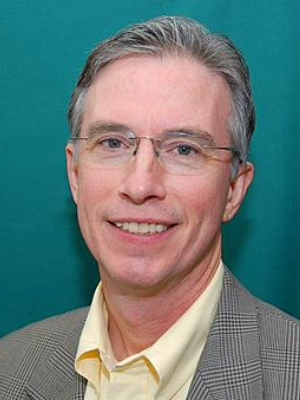
alum
Bob Workman recently retired after a four-decade career as a museum curator, administrator and educator. A native Wichitan who earned his BFA in Art History at WSU in 1978, Workman was fortunate to work as a student assistant at WSU’s Ulrich Museum of Art, then full time after his graduation. The Ulrich under the leadership of Martin H. Bush was a dynamic training ground, serving as a solid foundation for a career largely in art museums.
Married to fellow WSU art history graduate Liz, the couple moved to Boston in 1980 to pursue graduate studies – Bob in Art History and Liz in the MBA program at Boston University. While at BU, Bob worked at the Boston University Art Gallery and upon graduation in 1983 became a curator at the Museum of Art, Rhode Island School of Design. His exhibition The Eden of America: Rhode Island Landscapes, 1820-1920 was a regional favorite and garnered national attention with a segment on CBS Sunday Morning.
The Workmans relocated to the New York City area in 1987. Bob joined the American Federation of Arts, eventually becoming the director of its international exhibitions circulating program, and Liz had a successful career as a financial analysist. While at the AFA, Bob was selected to attend the prestigious Museum Management Institute, a program of the Getty Trust.
In 1995 Workman accepted the position of Assistant Director at the Amon Carter Museum in Fort Worth, Texas. While at the Carter, he served as the staff administrator of the $39 million expansion of the facility, working with internationally-renowned modernist architect Philip Johnson. This opportunity led to his hiring by the Walton Family Foundation to serve first as a consultant, then as the founding director of the Crystal Bridges Museum of American Art project in Bentonville, Arkansas. Workman’s role included the development of the world-class art collection, the facilities programming, and coordination of the design with architect Moshe Safdie.
After six years with Crystal Bridges, the Workmans returned to Kansas, where Bob was founding director of the Flint Hills Discovery Center. This informal science and history learning center is the showpiece of the $200 million redevelopment project in Manhattan, Kansas. As a fifth-generation Kansan, leading the construction and opening of the Flint Hills Discovery Center was a highly rewarding endeavor.
The opportunity to return to Wichita – and Wichita State University – in 2013 as the director of the Ulrich Museum of Art culminated a career spent bringing art and museum programming to communities across the United States and beyond. And in the process, two new institutions were launched and another substantially reinvented.

patron
Because of her compulsion to experience everything, Ann Garvey has had a full life lived in a multitude of places, experiencing transformational and collaborative creativity, and applying it to every aspect of her life. She is, for example, a licensed private pilot and scuba diver.
A true entrepreneur, she has initiated, developed, operated and managed 19 businesses. These began at childhood, with a day camp at 14 and continued to Honey Bear Petroleum Company, still operating today in Canada.
While living in Canada, she founded Calgary City Ballet and organized all the performing arts companies into one collaborative organization, creating the genesis for the creation of Calgary’s $85million Performing Arts Centre.
Since returning to Wichita, she has continued her active involvement in all arts, establishing the monthly Arts Forum comprised of—at last count—57 art-related organizations and agencies.
She was a director for the prestigious Mid-America Arts Alliance for 29 years and now holds Emeritus status. Ann has been a panelist for the National Endowment for the Arts and the Kansas Arts Commission, as well as the Wichita Arts Council, the last to specifically protect the Commerce Street district.
As a nonprofit advocate, she has hosted over 60 public benefits for 30+ organizations. For seven years she published Programs For the Arts, which consolidated Playbills for all the performing arts companies in six cities.
Many may remember the one-of-a-kind Galleria Fair as well as Mama Love's Kitchen, two of her entrepreneurial efforts in Wichita. She has co-produced four movies, including the recent “This Is Love” which has, of this date, won 21 international and national awards.
Although Ann has been involved with arts projects from all three schools in the College of Fine Arts at WSU, she has been a driving force behind the dance program for over 20 years and is a founding member of the board of Performing Arts Angels, the support group for the School of Performing Arts.
Her greatest “achievement,” her real pride and joy, is her son, Tristan Fair. She also loves to serve as the ultimate goodhumored, thoughtful officiant for weddings, memorial services and life launchings.
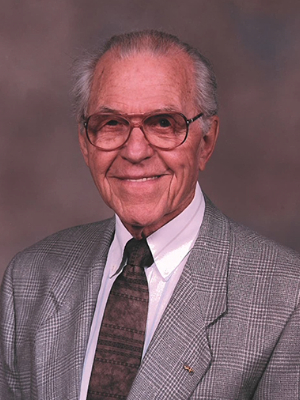
mentor
Harold Decker was a Midwesterner with a world view. Born in Kansas, educated in Iowa, Ohio and France, and teaching others in Iowa, Ohio, Kansas and Illinois (among others), Harold inspired those around him to seek musical excellence.
Decker’s years in Wichita from 1944-1957 were his seminal years, solidifying his belief in the inherent power of choral music to bring people together. This premise, and his untiring pursuit of excellence, permeated not only his teaching but his work within the community—as seen in his creation of the Wichita Choral Society and his association with the music ministry at First Presbyterian Church.
In his first two years at the then University of Wichita’s Music Department, Harold created a Madrigal group, Men’s and Women’s Glee Clubs, and expanded the University Chorus to 92 members. During the following two years, the A Cappella Choir was added, and the Madrigals began to include opera productions. As the department grew, it added new faculty and degree programs, including graduate classes.
During his 14 years as head of the voice and choral departments, Decker also became the first director of the Wichita Choral Society and the Wichita Symphony Chorus. He also co-authored two books on choral conducting, served as president of the American Choral Director’s Association (where he received their Distinguished Service Award), represented the U.S. at the 28th annual Handel Conference Festival in Halle, Germany, and was presented the Distinguished Conductor Award at the Ecole des Beaux-Arts in Fontainbleau, France.
Harold Decker had a profound influence on the early growth and level of quality seen even today in the School of Music. His devotion to fostering the highest standards in the teaching and performing of choral music, and his enduring love of his profession, are among his legacies. Harold Decker truly proved that we stand on the shoulders of those whose contributions preceded us.
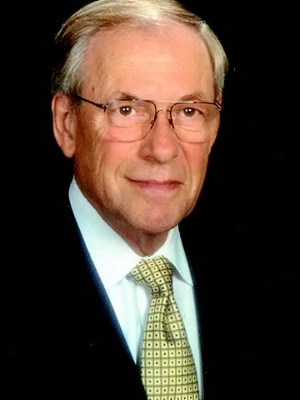
mentor
Dr. Jay Decker’s musical influence in Wichita spanned over sixty years, impacting the lives of countless young musicians and audiences in Wichita and across the country.
Jay began his musical career in high school as principal cellist in the Wichita Youth Symphony. Inspired by his father, Dr. Harold Decker, as well as numerous mentors and teachers, his love for music was born during those years.
He attended the (former) University of Wichita and was awarded the prestigious Naftzger Young Artist Award for cello performance. Jay received his master’s degree from the University of Illinois and his doctorate from University of Missouri-Kansas City, where he served on the faculty for eight years.
In 1971, he returned to Wichita as associate professor of music and director of orchestras in WSU’s School of Music. He led WSU orchestras on two European tours and in 1973 performed the first university production of Leonard Bernstein’s Mass with the WSU orchestra – an ambitious undertaking and one of many highlights during his tenure.
Jay also served as associate conductor of the Wichita Symphony, conducting the Wichita River Festival Twilight Pops Concerts, the Family Holiday Concerts and the Young People’s Concerts, among others. He officially held these roles for 25 years until his retirement from the University as Professor Emeritus in 1998, although he continued conducting and bringing music to Wichita for many years.
He conducted his final Wichita performance – the Nutcracker Ballet with the Ballet Wichita Orchestra – in December of 2016.
Dr. Decker inspired musicians and music lovers of all ages throughout his career and was proud to have had a part in Wichita’s enduring tradition as a city known for its great music and generous support for the arts.
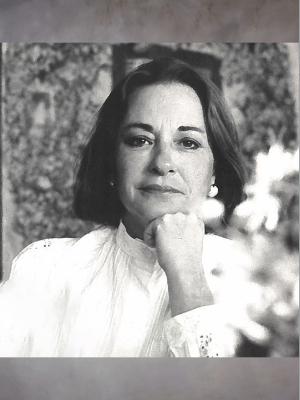
alum
Diane Thomas Lincoln has shown her work in numerous regional, national and international exhibitions, notably the Pontifical Marian Research Library at the University of Dayton; the Vatican Museum; Texas Tech International Cultural Museum; Marylhurst College; the Inter-University Center in Dubrovnik permanent collection; and other various institutions in the United States. Her artwork has been shown in over 200 exhibitions.
Diane and Gary Lincoln are noted for their liturgical art and commission works including projects on Saint Elizabeth Ann Seton, their work at Corpus Christi parish in Lawrence, Kansas, and a processional cross commissioned for Bishop Meige High School in Kansas City, Missouri.
Diane and Gary have won liturgical awards and honors, including the BENE award, the Modern American Liturgy Magazine national contest, and through Christians in the Visual Arts, Inc.
In addition to a rigorous local showing of art works, Diane extended her work into the community with students, alumni and community artists throughout the region. Diane served on numerous boards, including the Global Learning Center, National Conference for Community Justice, Kansas Multicultural Arts Alliance, Face of Hope, Methodist Urban Ministries of Wichita, Interfaith Ministries, Kansas Newman University Catholic Studies program, Archives of Modern Christian Art at the University of San Francisco, among others.
Though her work is multifaceted, the core of her artistic motivations and interests are focused on assisting art and artists in the community life, providing handmade objects, or other forms of expression. All her work reflects a keen interest in cultural storytelling, myth, spirituality, symbolism and nature.
No matter if she was working on a community project, restoring historical churches, assisting in the building of new environments for public and private use, writing poetry, essays, making collages or teaching, Diane said her deepest contemplation and well of nourishment for all work emanated from her love of the landscape and its culture.

alum
Millions of cinema devotees have heard Angela Parrish's buoyant vocals on “Another Day of Sun,” the song that opens the Academy Award-winning film musical La La Land.
Originally from Newton, Kansas, Angela graduated from Wichita State University with degrees in special music education and jazz piano performance. She then went on to earn a master’s degree in jazz piano from the University of Northern Colorado.
Following her education, Angela came to Los Angeles with $700 to her name. She wanted to pursue performing, a part of herself she was denying, she says. Angela was awarded by the Songwriters Hall of Fame and ASCAP with the 2017 Abe Olman Scholarship for Excellence in Songwriting. She was also named a New Folk Competition Finalist in the 2017 Kerrville Folk Festival.
Previously, Angela’s debut CD, Faithful and Tall, was nominated for a pair of Independent Music Awards, with the song “Borrowed Time” later selected as a Grand Prize Winner in the John Lennon Songwriting Contest.
Angela sang backup with Ben Folds at the Hollywood Bowl and headlined listening rooms on a national tour. Most recently, she has been heard as a backing vocalist for Florence + the Machine on their 2018 release High as Hope. Angela has also written and performed original songs for the upcoming film Chance due out later in 2019.
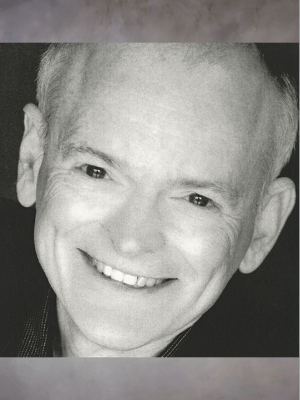
alum
Millions of cinema devotees have heard Angela Parrish's buoyant vocals on “Another Day of Sun,” the song that opens the Academy Award-winning film musical La La Land.
Originally from Newton, Kansas, Angela graduated from Wichita State University with degrees in special music education and jazz piano performance. She then went on to earn a master’s degree in jazz piano from the University of Northern Colorado.
Following her education, Angela came to Los Angeles with $700 to her name. She wanted to pursue performing, a part of herself she was denying, she says. Angela was awarded by the Songwriters Hall of Fame and ASCAP with the 2017 Abe Olman Scholarship for Excellence in Songwriting. She was also named a New Folk Competition Finalist in the 2017 Kerrville Folk Festival.
Previously, Angela’s debut CD, Faithful and Tall, was nominated for a pair of Independent Music Awards, with the song “Borrowed Time” later selected as a Grand Prize Winner in the John Lennon Songwriting Contest.
Angela sang backup with Ben Folds at the Hollywood Bowl and headlined listening rooms on a national tour. Most recently, she has been heard as a backing vocalist for Florence + the Machine on their 2018 release High as Hope. Angela has also written and performed original songs for the upcoming film Chance due out later in 2019.
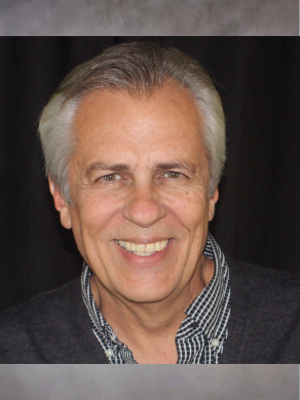
alum
Wichita native Hal Davis graduated from Wichita State University in 1972. He would like to credit his teachers/mentors Dick Welsbacher, Joyce Cavarozzi, Audrey Needles, and Mary Jane Teall for giving him the foundation to accomplish a successful life in the theatre.
After graduation, Davis completed an intensive postgraduate program at The London Academy of Music and Dramatic Art. It was there he made his London debut at The Holland Park Theater Festival in a production of Tartuffe.
Davis made his Broadway debut in Titanic, the Tony Award Winner for Best Musical, where he performed the roles of Capt. E.J. Smith and Mr. Isidor Strauss. He went on to perform nationally and internationally in over 70 professional productions from Broadway and Off Broadway to Stock and Regional Theatres. National Tours include Titanic, The Best Little Whorehouse, The King and I, Grease, I’m Getting My Act Together, and Joseph and the Amazing Technicolor Dreamcoat.
Other NYC credits include The Sound of Music under the direction of Jamie Hammerstein, Handy Dandy, with Jane Alexander/Jerry Orbach, and Professionally Speaking. Regional credits: Sweeney Todd (Theatre Virginia), Daddy Warbucks (CasaManana)and Sheriff Ed Earl Dodd (NCT).
Davis has returned to Wichita many times working with Stage One productions of Rough Crossing (Center for the Arts), The Fantasticks (MJ Teall), and My Way (The Orpheum). His continued association with Music Theatre of Wichita has remained strong over the decades starting in 1972 with Man of La Mancha, to last summer’s production of Newsies, playing Joseph Pulitzer.
TV: The Rise and Fall of Jim Crow (PBS), One Life to Live as Detective Frank Slocum (ABC), Loving (ABC). Recordings: Best Little Whorehouse with Ann-Margret, Good News (original cast recording).
In 2006, he moved from New York to North Carolina to become coordinator and assistant professor of Musical Theatre at UNC-P. After nearly 10 years of teaching, Davis retired and returned to his hometown. He is the proud father of Zachary and Abigail.
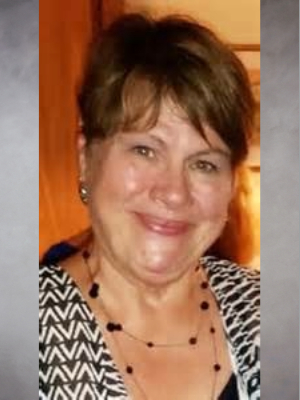
alum
Barbara Honn earned her BME and MM degrees in Music from WSU. Ms. Honn, soprano, has performed extensively in opera houses and concert halls throughout Europe and the United States.
During her singing career, Honn appeared in the opera houses of Germany, Portugal, Spain, Hungary, Switzerland, Austria, Belgium, the Netherlands and the United States. A few of the roles she has sung to critical acclaim are: Donna Anna, Don Giovanni; Amelia, Un Ballo in Maschera; Ariadne, Ariadne auf Naxos; Marie, Wozzeck; and Elizabeth, Tannhäuser.
A recipient of the West Deutscher Rundfunk Award, she has been heard in radio performances of the Verdi Requiem, Brahms’s Ein Deutsches Requiem, Dvorak’s Requiem, Beethoven’s Symphony No. 9, and Mahler’s Symphony No. 2 and Symphony No. 8 (Symphony of a Thousand). She was also awarded the Rheinisches Westfallen Medale die Kunst.
Honn has served as director of the Grandin Festival, an annual vocal and instrumental chamber music festival in Cincinnati. She has been a voice faculty member of many summer, apprenticeship and university programs, including the Israel Vocal Arts Institute in Tel Aviv, Israel; L’Opera Bastille in Paris, France; The American Institute of Musical Studies in Graz, Austria; Lucca Opera Theater in Lucca, Italy; The Institute of Vocal Arts in Chiari, Italy; Canta in Italia in Florence, Italy; Instituto Superiore del Arte in Buenos Aires, Argentina; The Academy of Vocal Arts in Philadelphia, Pennsylvania; Bel Canto Northwest in Portland, Oregon; Westminster Choir College in Princeton, New Jersey; Wichita State University in Wichita, Kansas; The University of Texas in Austin, Texas; Glimmerglass Opera in New York; and has also given many master classes, concerts, and recitals worldwide.
Honn’s students are teaching in universities and conservatories in the United States, Puerto Rico, Korea, Spain, China, Canada and Belgium. She also has students performing in opera houses around the world, including The Metropolitan Opera, Houston Grand Opera, Florida Grand Opera, San Francisco Opera, Chicago Lyric Opera, the Spoleto Festival in the United States and in Italy, Hamburg Staatsoper, Cologne Opernhaus, Frankfurter Opernhaus, Vienna Staatsoper, London’s Covent Garden, and Milan’s La Scala.
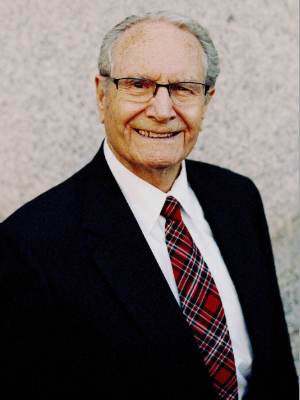
mentor
Bill Mathis joined the music faculty at Wichita State University in 1969. Following award of a teaching fellow and Ph.D. from the University of Michigan (1969), Mathis was appointed coordinator of graduate music studies at WSU. When Dr. Charles Spohn followed Walter Duerksen as dean of the College of Fine Arts in 1970, he reorganized the college into independent departments, and Mathis was elected chair of the newly formed Music Performance Department.
In a subsequent reorganization of the CFA into Schools of Music, Art and Performing Arts in 1987, he was elected director (chair) of the reconstituted School of Music. He was appointed associate dean of Fine Arts in 1993 and served on or chaired numerous departmental, college and university committees and councils, including the Graduate Council and University Senate, serving as senate president from 1982-83.
Prior to his work at WSU, Mathis served on the faculty of Brigham Young University, directing music programs of the experimental Laboratory School, College of Education, with concurrent appointment (woodwinds) in the School of Music. Previous to his Kansas residency, he was an active performer as principal clarinetist and woodwinds player in the Utah Valley Symphony and orchestras accompanying opera and music theater productions in the Provo and Salt Lake City metropolitan areas.
He maintained an active schedule of guest conducting, clinic presentations, and adjudicating music festivals in Utah, Kansas, and adjoining states, and he was a conductor for ten years with his colleague, the late Dr. Jay Decker, in the Wichita Symphony sponsored youth orchestra program, leading the younger of two regional honor groups in this capacity.
Dr. Mathis held regional and national leadership positions in organizations such as the Music Educators National Conference, Utah Music Educators Association, Kansas Music Educators Association, College Music Society, and National Association of Schools of Music. He was appointed a national accreditation examiner by NASM, conducting 10-year accreditation reviews of university music degree programs. In his retirement, Mathis still leads a church choir and plays a little jazz saxophone.
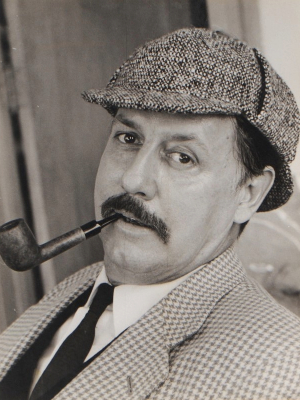
alum
Malcolm Myers was born in Lucerne, Missouri in 1917. He received his BFA in 1939 from the University of Wichita, his MA in 1941, and his MFA in 1948 from the University of Iowa.
From 1946 to 1948 he was an instructor of printmaking at the University of Iowa, and in the following year joined the University of Minnesota's Department of Art. He was a professor of studio art until his death in 2002, a span of over 50 years.
In the 1950s, he received two Guggenheim Fellowships that took him to Paris, where he met Joan Miro and took the opportunity to travel throughout Europe and to Mexico where he worked with Diego Rivera and began a collection of pre-Columbian art. Throughout the 1960s, Myers maintained ties to more classical modes and representational, although abstracted, forms. Printmaking was booming as painters and sculptors were becoming increasingly interested in print applications as a means of presenting their ideas in accessible editions. Myers organized a series of print workshops for artists, contributing to a national movement toward collaborative learning in the field.
His work is recognizable for its unique imagery, notably his emblematic depictions of all species of animal. Although he was focused primarily on intaglio, or etching and engraving techniques, Myers worked through both painting and prints when pursuing a series and revisited signature themes over the years, In the studio, he was influenced by the rhythms of jazz.
He exhibited a passion for drawing at an early age, recalling cowboys and horses as favorite subjects, forms that would return in his mature work, along with other animal motifs.
In 1982, the University Gallery at the U of M presented a one-man survey of Myers’ prints, from student to late career, in a variety of techniques. In her introduction, Gallery Director Lyndel King called him “an artistic institution at the U of M (who) approaches printmaking as he seems to approach life, with a witty, yet almost laconic sensibility.”
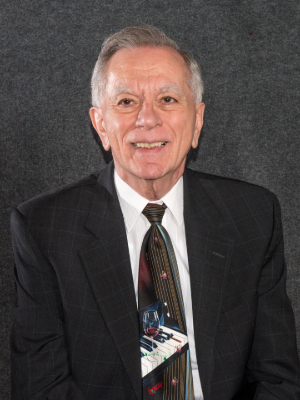
patron
A Wichita native, Stev Overstreet earned a Master of Science in Administration from Wichita State University. He is a Vietnam War veteran and left the active Army as a Captain. Except for his four years of military service, Overstreet has lived in Wichita his entire life. He is currently employed part time as the Global Real Estate Manager for Spirit AeroSystems, having served Boeing/Spirit for almost forty years.
Overstreet enjoys participating in numerous arts and cultural organizations in the Wichita community as well as organizations related to his hobby of clock collecting. He currently serves as secretary of the Sunflower Clock Watchers chapter of the National Association of Watch and Clock Collectors. He has a long tenure on the board of directors for his church, Table of Hope MCC, and currently serves as clerk/secretary.
Overstreet’s involvement with arts organizations dates back to his return to Wichita in 1973 after leaving the military. His initial service was on the Board of Wichita Community Theater during the era of Mary Jane Teall. He served a number of years holding most offices, including president, and remains a strong supporter/patron.
It wasn't long before Overstreet discovered WSU Fine Arts and started attending virtually every production. He has served on the boards of Music Associates (including as president), the Dean’s Advisory Board/Friends of Fine Arts, and was a founding member of Performing Arts Angels (serving as secretary of the board since its inception). He is also a member of the Ulrich Salon Circle and Art and Design Advocates.
Overstreet was an early financial supporter of the Musical Theatre program and has provided ongoing annual financial support to the College of Fine Arts Dean’s discretionary fund to be used primarily for scholarships. A College of Fine Arts scholarship fund will be established through planned giving. He is a member of the Society of 1895, a life member of the Fairmount Society and ongoing member of the President’s Club.
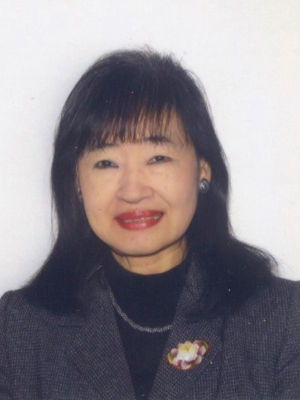
patron
Shoko Kato Sevart has been an active arts advocate, volunteer and patron for a wide range of cultural institutions in Wichita, in Kansas, in the United States and even in her native Japan.
Born in Akita, she attended Meiji University in Tokyo, studying law. While there, she met and married her late husband, Dan, who was serving in the United States Air Force. She continued her education in the U.S. receiving both a BA in Political Science and a Juris Doctor Degree from Washburn University. Sevart and her husband subsequently opened their own law firm in 1983.
They balanced their commitment to the arts with their professional obligations as partners, and her passion and support of the arts began to expand, starting with the Wichita Symphony in 1987, where she served as president from 1989-1991.
Sevart has also served on the boards of the Association of Community Arts Agencies of Kansas, Ballet Wichita, Music Theatre Wichita, Heartspring, Newman University Fine Arts, Opera Kansas, Washburn University School of Law Alumni Association, Wichita Center for the Arts, Mark Arts, and Wichita Chamber Chorale.
At Wichita State University, Sevart has been on the National Advisory Council and the Ulrich Advisory Board. She was one of the founding board members of Music Associates in 1992, and has been on the Fine Arts Advisory Board, Canta in Italia, Performing Arts Angels, and is also a member of the Art & Design Advocates and Salon Circle.
Her notable special arts and professional awards include the 2000 Kansas Arts Commission Governor's Arts Award for Art Patrons; Newman University’s Jean C. Stevenson Community Service Award in 2003; The Wichita Arts Council Gordon W. Evans Award in 2004; Wichita Bar Association Lifetime Achievement Award in 2006; Wichita Convention & Visitors Bureau 1996 Partnership Award; and the Robert G. Braden Award from the Wichita Symphony Society in 2015. For many of these, she was a co-recipient with her husband.
Sevart has served on the Grant Advisory Panels for the Kansas Arts Commission in 1992, 1993 and 1994. She was appointed to the National Endowment for the Arts in Washington D.C. in 1995 and serves on the Grant Advisory and Policy Panels for Music, Musical Theatre, Opera and Learning in the Arts for Children & Youth, Local Arts Agencies.
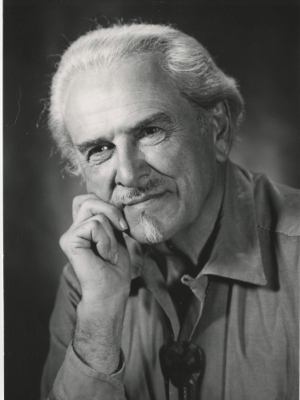
mentor
Born on a farm in Osceola, Wisconsin, Clayton Staples knew he wanted to be an artist even as a child. He went to Minneapolis, Minnesota to study art, then to Chicago to obtain a more formal art education at the Art Institute of Chicago.
In 1930, after a brief tenure at Illinois State University, Staples was offered a position at the University of Wichita, now Wichita State.
By the time Staples assumed his position, he had traveled the world, visiting the great museums of Europe, North Africa and the Middle East. During his tenure as director of the art program, he built a tradition that brought national attention to WSU, through the development of the curriculum and the remodeling of building space.
Because of the high quality of education offered, the University was able to offer the Bachelor of Fine Arts degree. The University hired more teachers and staff and added the first advanced art degree program to be offered in Kansas, the Master of Fine Arts, one of the first ten MFA’s to be offered in the United States.
In addition to growing the art department at the university, Staples remained active in the community and also continued to develop his own art career. He painted regularly and spent his summers in Gloucester, Massachusetts with some of the foremost artists of his time. During these summer visits, he painted spectacular seascapes and harbor scenes, which earned him praise from critics, art lovers and his fellow artists.
Upon retirement, Staples moved to Colorado where he continued to paint and conduct a summer art school. His favorite subjects were landscapes of the scenic area, many of which included his home and school. It is apparent that Staples regarded Kansas as home and thought fondly of his years at Wichita University because he left many paintings, as well as money, to the University upon his death in 1978.
Staples will always be remembered fondly by Kansans for all he did for the university and the art community. He was actively involved in Rotary International and in 1972 was honored with an art scholarship in his name at WSU. In 1978, just before his death, an art gallery was named after him in McKnight Art Center.
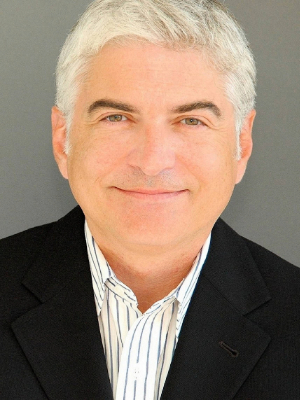
alum
Ray Wills has been a professional actor and educator for over 35 years. He appeared in the original Broadway casts of The Producers, Wonderful Town, Big, and Anna Karenina, and performed with the New York Philharmonic at Lincoln Center in Candide. His numerous Off-Broadway credits include All in the Timing, Wise Guys, Side by Side by Sondheim, A Class Act, and The Rothschilds. Television credits include Law and Order, Law and Order Criminal Intent, Law and Order SVU, Ugly Betty, The Protector, 90210, and a recurring role on The Guiding Light.
On film, Wills has been seen in Nixon, The Producers, Pootie Tang, and several documentaries. He has also performed at many of America’s most distinguished regional theatres.
In Wichita, he has trod the boards of Music Theatre of Wichita, The Forum Theatre, Crown-Uptown Dinner Theatre, Mosley Street Melodrama, Roxy’s Downtown, and Wichita Community Theatre. Currently, he is the producer and host of a new entertainment radio show, “Kansas Radio Theatre,” which can be heard on 11 stations statewide.
Wills grew up in Wichita and received his BA in speech communications/theatre from Wichita State University in 1983. He also earned an MFA from Brandeis University in 1985. At WSU, he was a four-year Miller Scholar, recipient of the George Wilner and Young Alumni Awards, and was a member of Homecoming Royalty his senior year. In 2014, he was invited to deliver the commencement address to the WSU College of Fine Arts.
As an educator, Wills has been an instructor at Wichita State University and Kean University in New Jersey, and is currently a member of the theatre faculty at Newman University and communications faculty at Butler Community College. He is a proud member of Actors Equity and SAG-AFTRA.
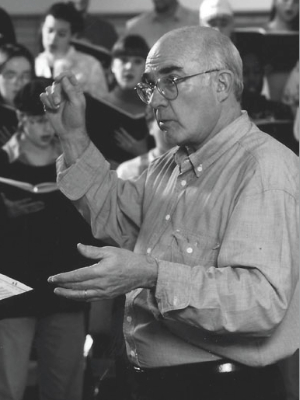
mentor
Harrison Boughton was professor and director of choral music at Wichita State for 39 years. His groups appeared at numerous state, regional and national music conventions including Kansas Music Educators Association, Music Educators National Conference, American Choral Directors Association, and Music Teachers National Association. Boughton made several extensive tours of Europe and South America with these groups. After graduating from the University of Iowa, he taught public school music in Iowa and voice and choral music at William Jewell College and Evansville University before coming to WSU.
During his career, he served as guest conductor, clinician and adjudicator throughout the U.S. as well as at the Austrian Choral Directors Association in 1981. In 1985, he was recipient of the Harry Robert Wilson Award in recognition of his contribution to choral music in Kansas. In 1991 and 1999, the WSU chapter of Mortar Board recognized him for "outstanding inspiration and student support." He also received the Alumni Award for professional achievement from his alma mater, the University of Iowa, in 1995. In 1996, he was presented with the Wichita State University President's Award for Extraordinary Achievement, and in 1997 he was candidate for distinguished professorship.
Boughton forged an inspiring legacy during his time on the music faculty at WSU, serving 22 years as chair of the voice/choral program and recruiting an array of students who achieved national and international acclaim, including Samuel Ramey, Joyce DiDonato, Alan Held, Karla Burns, and many others.
"I’ve been extremely blessed,” he said. “I have worked with thousands of students since 1961 who have gone on to teach, perform or appreciate choral music, and I hope that I’ve played some part in enriching their lives artistically, socially and spiritually."
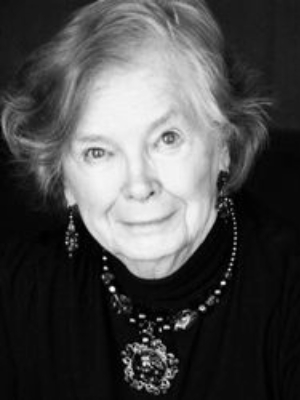
mentor
In her long professional career, Joyce Cavarozzi directed more than 110 productions and designed costumes for more than 150, most as a member of the Theatre faculty at Wichita State University. She has also performed on stage, on television, and in several movies, such as The Attic and Twister
With a special interest in Shakespeare and contemporary theater, Joyce was a moving force in the performing arts in Wichita for five decades.
She was a graduate of Ohio University and Ohio State University.
Many of her students have received national college theater attention, and she had more than three dozen students nominated for the Irene Ryan acting award. At WSU, she was president of the faculty senate and received the President’s Award for Distinguished Service. In addition, she was inducted into the Mary Jean Teall Theatre Hall of Fame and was member of the WSU Foundation Society of 1895.
However, her influence reached far beyond Wichita. She received the Kennedy Center American College Theater Festival Gold Medallion for Excellence in Theatre and the Meritorious Achievement Award in costume design. Her excellent work with the Kennedy Center American College Theatre Festival, including a term as Regional Chair, made the University Theatre recognized nationally.
She was past president of the WSU Faculty Senate, a member of the WSU Foundation's Society of 1895, and was honored with a brick in the Plaza of Heroines. Joyce Received the Kennedy Center Gold Medallion for educational theatre, as well as their Commendation for Excellence, yet her real award, she said, were her students.
Perhaps her most fervent enthusiasm was, ultimately, for the total art of Theatre. A talented, sensitive actor herself, she preached the gospel of theatre as the most human of the arts to any audience who would hear.
Joyce was active in theatre through National Partners of American Theatre, and her namesake Scholarship in Theatre is awarded every year to a full-time student in the School of Performing Arts.

alum
James G. Davis had a quiet voice, but his paintings spoke loudly and with eloquence, humor, and rich narratives. His works have been shown across Europe and America, and are in collections such as the Metropolitan Museum of Art in New York, the National Gallery and Hirshhorn Museum, both in Washington D.C., and the Tucson Museum of Art.
Davis was born in Springfield, Missouri, one of six brothers. “His life was totally bizarre and interesting,” says his wife Mary Anne Davis. His mother died when he was just three, and the rest of his adolescence took several uncanny twists involving time in an orphanage, a train accident that took half of a foot, dropping out of school in 9th grade, and taking odd jobs such as a bellhop just to survive.
While he struggled, he drew. And he loved it. He eventually went to Wichita State University, got his BFA and MFA, taught, and met his wife Mary Anne. They settled in Tucson in 1968, where Davis taught at the University of Arizona until he retired as professor emeritus in 1990. Many of his paintings are about the observations of everyday people and their struggles and pursuits. He was the champion of the everyman. There’s a struggle to represent the daily conflicts and loneliness and aspirations of the people all around him.
Upon his retirement from the UA, Davis filled the subsequent years with travel, exhibitions and painting. He slowed down and stopped painting about five years ago, but he took up the harmonica and found joy in playing it for others. “He melded into a very beautiful person, so sweet and gentle,” said Mary Anne. “He wanted to go somewhere every day. He loved a glass of wine, and he never stopping saying, ‘I love you.’”
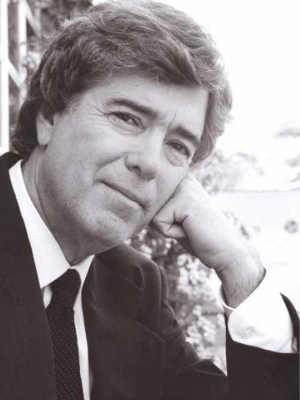
alum
Dean Hargrove has written and produced hundreds of television programs in the US and around the world. His credits include The Bob Newhart Show, The Man From U.N.C.L.E., It Takes a Theif, Columbo, The Perry Mason Movies, Matlock, and many more.
But Hargrove’s roots are in Kansas and Wichita, and the connection remains strong. Hargrove graduated with a bachelor’s degree in political science, and some of his favorite memories of college are the relationships he established with professors such as David Farnsworth and the controversial Steve Worth.
It was probably Hargrove’s participation in his fraternity and especially his time spent writing and directing shows for the student performance event called Hippodrome that spurred on his love of theater and film. After graduation, he moved to California to attend film school at UCLA, but left after about a year to pursue a writing career in television.
His first job was writing for The Bob Newhart Show. That led to other freelance jobs until he became the sole staff writer in 1964 for The Man from U.N.C.L.E. “That show opened a lot of doors for me,” says Hargrove, describing a career that took him from a contract with Universal to one with Viacom and then Warner Brothers and eventually Sony International Television. Along the way he wrote and produced such hits as It Takes a Thief, Columbo, Matlock, Jake and the Fatman, and Diagnosis: Murder. He also created three mystery movie series for the Hallmark Channel - McBride starring John LaRoquette, Jane Doe starring Leah Thompson, and Murder 101 starring Dick Van Dyke.
Hargrove won a Primetime Emmy Award in 1974 for Columbo and was nominated four other times. He also won a Golden Globe that year and four other nominations over time. As one of Wichita State’s most distinguished alumni, Hargrove was awarded the WSU President’s Medal in 1996 and gave the university commencement address that year. Hargrove is married to Brenda, a professional photographer. One of their favorite pastimes is — what else? — watching television.
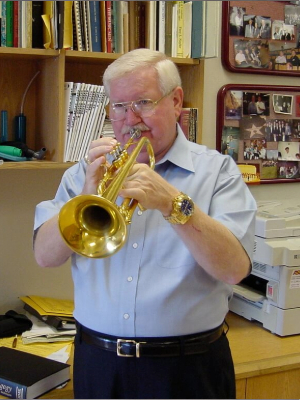
alum
David Hickman is one of the world’s leading classical trumpet soloists and teachers, having released 19 solo albums and touring the world numerous times. He has been a guest soloist with over 2,000 orchestras and is the founder and president of the large American ensemble, Summit Brass. He is one of the founders of the International Trumpet Guild and served as its president from 1977-79. His 45 years of university teaching have produced hundreds of leading professionals who occupy chairs in major symphony orchestras, military bands and chamber ensembles, as well as professorships at over 150 colleges and universities.
Hickman’s publications include books such as Trumpet Pedagogy: A Compendium of Modern Teaching Techniques and Trumpet Greats: A Biographical Dictionary, Music Speed Reading, The Piccolo Trumpet and many others. He has also published editions of over 150 trumpet solos. The International Trumpet Guild has awarded him both the Award of Merit and its prestigious Honorary Award.
Hickman has also commissioned numerous works for trumpet by such composers as Anthony Plog, Thom Ritter Geiorge, Michael Conway Baker, Daniel Thrower and Oskar Morawetz. He has given U.S. and world premieres of several important concertos and was the first to record many significant trumpet solo works. In 2005, Hickman received the prestigious Award of Merit from the International Trumpet Guild for his lifetime achievement and service to the world of trumpet.
A native of Kimball, Nebraska, Hickman received his Bachelor of Music degree from the University of Colorado-Boulder in 1972 and then became a graduate teaching assistant under Dr. Walter Myers at Wichita State University (MM degree in 1974). He taught at the University of Illinois from 1974-82 before accepting a position at Arizona State University. ASU conferred upon him the title of Regents’ Professor of Music in 1989, a position he still holds.
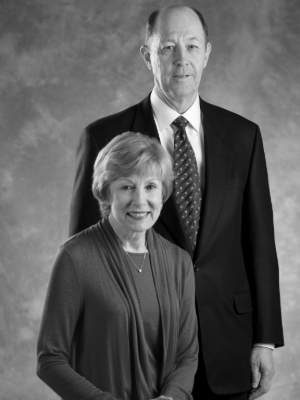
patrons
Mike and Dee Michaelis first met in Junior High, but only really became "an item" for good while they were both studying at the University of Kansas. They married shortly after graduation and gave birth to their only child, a son named Matt, in 1971.
Mike Michaelis is the Vice Chairman of the Board of Wichita-based Emprise Bank, a community bank that, under his management, expanded dramatically -- currently Emprise possesses more than $1.5 Billion in assets and serves some 20 communities in the Kansas area.
Art has long been a special focus, both personally for the Michaelises, and in creating a bar-none corporate art collection of more than 1,000 works of Kansas art and artists. (A behind-the-scenes art tour of the Emprise collection and the extensive art storage facilities is a must-do for any Kansas art-lover).
Little known fact: Mike played on the basketball team at KU. Wow! A natural athlete, Mike has parlayed that early basketball talent to a lifelong love of squash, in which he is a competitive player, taking on multiple games a week.
Dee worked as an Early Childhood Teacher/Pre-K, in addition to her own varied artistic endeavors. She is an accomplished weaver and artisan. (And the best Grandmother in the world to her 3 grandkids).
Dee is also a gourmet chef and baker and was an early adopter of the "whole foods"/natural food lifestyle, being the daughter of one of Wichita's early natural grocer/health food purveyors. (In fact, for years, Dee herself would bake Christmas cookies - from scratch - for every employee at Emprise Bank!)
Mike has received numerous awards for his role as a Patron of the Arts -- including the Americans for the Arts' prestigious Business Top 10 award in 2008 and a Governor's Art Award in 2007 from then-Governor Kathleen Sebelius.
He has served on the Boards of numerous art museums and institutions, including the Wichita Art Museum, the Spencer Art Museum at the University of Kansas, the Ulrich Museum of Art at Wichita State University, and recently spearheaded a multi-million dollar capital campaign for the construction of the new Mary R. Koch Arts' Center (known as MARK Arts).
Art from the Emprise Collection is currently on loan to the Museum of Modern Art and has been showcased in the U.S. Department of State's "Art in Embassies" Program.
Mike hails from an old Kansas family from Russell, Kansas (though both Mike and Dee grew up in Wichita). Mike has fond memories of spending young summers working the concessions stand at "The M & M" (the beloved drive-in movie theater in Russell his grandparents created and ran).
Mike and Dee now divide their time between Wichita, Kansas City, and New York City. They layer in a yearly trip to Santa Fe, New Mexico; meeting with artists, gallery-owners, and other art-world luminaries in each location. The couple's passion for art informs everything they do.
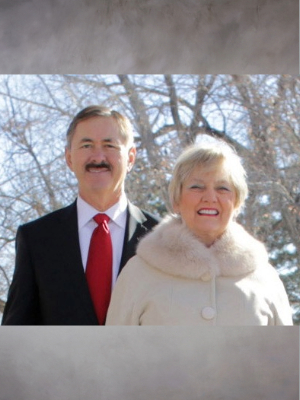
patrons
Ann and Dennis Ross are well known for their appreciation, passion, and long-time support of three things – their church, church related music (particularly music for the organ), and opera. Wichita and Wichita State have benefited significantly from these passions.
Born and raised in rural Nebraska, both Ann and Dennis derived their work-ethic and their commitment to community service from the values instilled in them growing up. Ann became a nurse, and Dennis became a specialist in nephrology, becoming a leader in his field.
In 2005, the Rosses established the very first Faculty Chair of Distinction in the College of Fine Arts. This chair was in organ. Three years ago, the Ann & Dennis Ross Faculty of Distinction in opera was announced. It was this position that drew internationally renowned bass-baritone Alan Held to Wichita State.
This was a natural transition for them because the Rosses have supported Wichita Grand Opera for many years, with Dennis sitting on the board as Chairman Emeritus. At Wichita State, the Rosses have supported a variety of music programs. They were generous supporters of the effort several years ago to bring Samuel Ramey to WSU through establishment of a guest artist-in-residence program. Additionally, Ann and Dennis have established student scholarships related to these disciplines.
Ann and Dennis have the distinction of being among the top philanthropic leaders for music in this community. To quote Ann Ross, “You should try to serve God and you should try to serve your fellow man,” she said. “There are two ways to serve your fellow man. You can preserve life, and you can preserve the quality of life. Music is one way we can help preserve the quality of life.”
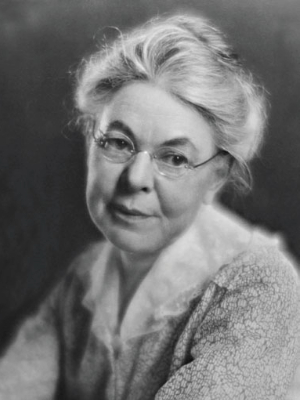
mentor
From 1901 to 1936, Elizabeth Sprague was the first chair of the art department at Fairmount College, now Wichita State University. She was living in Boston, Massachusetts when she was recruited by Fairmount College President Nathan J. Morrison. He may have met her while traveling to Boston to raise funds for Fairmount College.
Miss Sprague came to Wichita with experience teaching art in Michigan and an art degree from the Massachusetts School of Art. She was in her late 30’s when she joined the faculty in Wichita. As an artist in her own right, she typically painted still lifes and landscapes inspired by what she saw in Kansas and Colorado, where she often spent vacations. Flowers were a favorite subject. Petunias , circa 1930, is owned by the Wichita Art Museum, a gift of George Volmer.
In 1935, as she neared her retirement year, praise was printed in the Wichita Eagle about Miss Sprague which was written by Victor Murdock, nephew of Roland F. and Louise Caldwell Murdock. He wrote that Miss Sprague’s descent from colonial Bostonians—with their commitment to representative government and to community service—instilled in her an almost missionary zeal to improve the lives of her fellow citizens.
Miss Sprague has been identified as belonging to a group of leading women who laid the foundation for a thriving visual arts culture in Wichita. This group included Louise Caldwell Murdock, (her bequest established the American art collection for the Wichita Art Museum), Maude C. Schollenberger (founding director of the Wichita Art Association) and Elsie Allen, who commissioned architect Frank Lloyd Wright to design one of his famed prairie style homes in College Hill known as the Allen-Lambe house. Miss Sprague brought the design principles of the Arts and Crafts movement to the American plains and along with these important women, was a pioneer for the visual arts in Wichita.
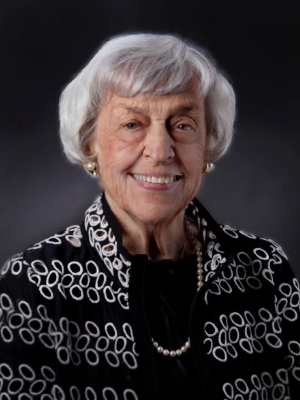
patrons
E.W. “Pete” and Mildred “Mickey” Armstrong have been long and active community leaders and generous supporters of Wichita State University. Since Pete’s death in June of 2009, Mickey has continued that involvement. Pete graduated from the University of Wichita in 1942, cum laude, with a major in chemistry and a minor in journalism. Mickey graduated in 1945 with a major in English language and literature and a minor in history and secretarial science. While attending WU, they shared a love of theater; Mickey performed in “The Contrast” her freshman year and Pete performed in the operetta “The Wild Flower.”
Co-chairs of the “Campaign for Students” during the mid-90s, they realized that “every little bit helps” concerning scholarship money. From that time forward, they established endowed scholarships in multiple colleges. The Mickey and Pete Armstrong Performing Arts Scholarship was established in 2006 by Mickey in support of music theatre students. As part of their continuing support of WSU, Pete and Mickey gave to many areas across the university. They were, for example, instrumental in obtaining the Gordon Parks collection, one of the most important and influential collections of papers and memorabilia in Wichita State’s possession, and the springboard for the expansion of the Ulrich Museum’s collection of Gordon Parks photographs into the second largest in the world.
While their financial support of Wichita State and, in particular, its College of Fine Arts, has been consistent and substantial, it is their commitment of time and talent that have been particularly appreciated. Mickey continues to be active in all aspects of the college. She has served on the boards of the Fine Arts Advisory Board, serving two terms as its president, the Friends of Fine Arts board, Music Associates and the Ulrich Advisory Board. Mickey is also interested in other aspects of the university and the community. She is a member of the Student Affairs Advisory Board and has been involved in many community activities including Music Theatre Wichita and Chamber Music at the Barn.
Mickey and Pete have four daughters, all of whom attended Wichita State.
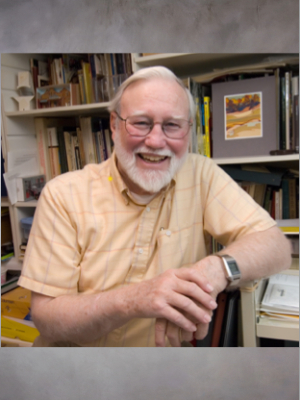
mentor
Clark V. Britton, Jr. was born in 1930 in Baltimore, Md. He graduated from Auburn University with a bachelor’s degree in graphic design in 1952 and completed his Master’s of Fine Arts degree in 1954 before being hired as an instructor. He accepted an appointment as instructor at the University of Wichita in 1957 to head the graphic design program. Further studies began in 1961 at Ohio State. In 1980 he attended MIT to study computer graphics. During his tenure at WSU he served in various capacities and was the chair of the graphic design department for 15 years.
Since 1952 he has exhibited in international, national and regional juried exhibitions, with one painting appearing in the National Collection of Fine Arts at the Smithsonian. He has worked as a designer, illustrator and film maker and has received awards from various professional organizations for his book designs, illustrations and films. The Johnson County Topeka Center for the Book has purchased 43 of his private press publications for their collection.
Clark retired from WSU in 2000. Since that time, he has continued to practice his art and has exhibited widely in the region. His last exhibition was in December 2015 hosted by the Rueben Sanders Gallery. Washburn University Library has 100 Kansas landscape drawings and a series of 38 illustrations for the exhibit “Postcards from Midland” in their Tom Averill Kansas Historical Collection.
Clark continues to live and work in Wichita.
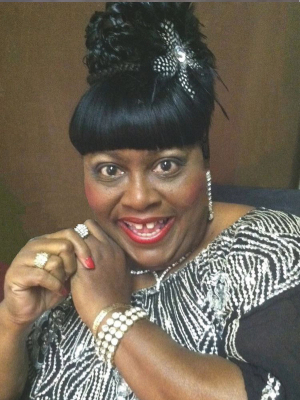
alum
Karla Burns is an operatic mezzo-soprano and actress who has performed nationally and internationally in opera houses, theatres, and television. Her outstanding performances have led to features in national and international publications including, Time, People, and Newsweek magazines, and The London Times. Among her many awards she is notably the first black person, African-American or otherwise, to receive Britain’s most prestigious theatrical award, the Lawrence Olivier, for her portrayal of Queenie in Jerome Kern and Oscar Hammerstein II’s Show Boat.
Karla was born and raised in Wichita, Kansas. She credits her parents Ira Willie Lee Burns and Catherine Scott Burns for inspiring her musical gifts. Her father was a jazz and gospel pianist and her mother sang spirituals and old hymns at home and in church. Burns attended Wichita State University where she earned a Bachelor of Fine Arts in Music Education and a Bachelor of Arts in Theater Performance. After graduating college she appeared throughout the world in musicals, classical theatre productions, operas, and revues.
Karla has appeared at some of the most distinguished venues in the world, including the Paris Opera, the Teatro Real in Madrid, Spain, and Egypt’s Cairo Opera House. In New York she debuted at The Metropolitan Opera in Porgy and Bess and performed at Carnegie Hall in Trio, a jazz opera. Other New York venues include Live at Lincoln Center and Shakespeare in the Park where she appeared in productions of Shakespeare’s The Comedy of Errors and Measure for Measure. The 1982-83 Broadway revival of Show Boat earned her a Drama Desk Award and a Tony nomination. London’s Opera North/Royal Shakespeare Company production of Show Boat marked her West End and United Kingdom debut for which she won the 1991 Olivier Award for Best Supporting Performance in a Musical. Karla also tours a one-woman show based on the biography of Oscar winner Hattie McDaniel titled Hi-Hat Hattie.
Karla is not without honors in her home town. She received the Kansas African American Museum Trailblazer Award in 2000 and was given the Wichita Arts Council Award for Performance and Education in 2012. In addition, she received a proclamation from Mayor Carl Brewer for her work with the Wichita community and was named one of the top Forty faces that changed Wichita State University in the Millennium. She currently resides in Wichita, performs nationally and internationally, and has a full roster of private students as she shares her talents and experiences with the next generation.
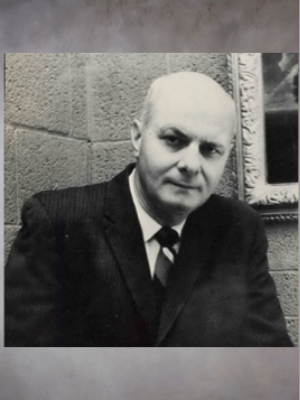
mentor
Dean emeritus of the College of Fine Arts, Walter J. Duerksen was born in Enid, Okla. and graduated from high school in Wichita. He earned his bachelor's degree in music from the University of Wichita in 1931 and his master's from Northwestern in 1937. He also studied at Columbia University and at the Juilliard School of Music. He taught in the Sedgwick County public schools before joining the faculty at the University of Wichita. At WSU, he was instrumental music instructor, director of bands, director of the School of Music and dean of the School of Fine Arts. He was a member of the Music Educators National Conference, Kansas Music Educators Association, Phi Mu Alpha and the Music Teachers National Association. He served his community as a founding member of the Wichita Symphony Society Board, the Wichita Fine Arts Council and the Wichita Community Theatre Board.
One year after his graduation, in 1932, Walter assumed directorship of the Reserved Officer Training Corps (ROTC) band at WSU. He was the first band conductor to be full time in the Music Department. The ROTC band’s main purpose at that time was to supply musical enjoyment, prepare formal concerts and to perform at football games. Walter also established a second band, not associated with ROTC, in 1939. By 1941, he was in charge of three WU bands, an ROTC Marching Band, an ROTC Concert Band and a University Concert Band.
Duerksen went on to accrue a national reputation as both a passionate and effective music educator. He was on the editorial committee of the Music Educator Journal and served on the MENC Commission on Accreditation. He is also a member of the Kansas Music Educators Association Hall of Fame. His reputation and impact upon Wichita State and its fine arts programs culminated in the renaming of the Fine Arts Center, opened in 1956, as the Duerksen Fine Arts Center.
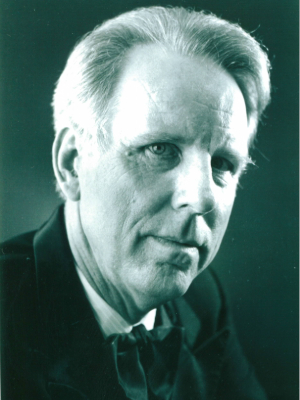
mentor
A native Texan, George Gibson’s formal education began at Texas Lutheran University, followed by a bachelor’s of music degree in vocal performance from the University of Miami, Fla., a master’s of music degree in vocal performance from the University of Texas at Austin and doctor of musical arts degree in opera performance from the University of Southern California. Further study, as a Fulbright scholar, was at the Hochschule für Musik in Munich, Germany.
George’s professional repertoire consists of 65 leading roles in opera, oratorio and musical theatre. His performances took him from coast to coast, appearing with opera companies throughout the United States. He was represented for years by Alexander Haas Artist Management of Los Angeles.
In 1967 he began his association with Wichita State University as assistant professor of voice and director of opera theatre. During the following 29 years, the opera department grew to become one of the finest of its kind. He served in all capacities: producer, stage director, coach, conductor and fundraiser. Eighty-five productions were given under his leadership. His former students include Samuel Ramey, Joyce DiDonato, Alan Held, Beverly Hoch, Karla Burns, Catherine Cook, Stephen Tharp, Barbara Honn, Thomas Baresel, Myrna Paris, Darleen Kliewer-Britton, Brian Frutiger, Mary Law, Marlene Flood, Meg Mackay and Stephen Fiol. His students have sung, or are singing, in all of the major opera houses of the world. He has been an active member of the National Association of Teachers of Singing for many years, and has been a master teacher for their interim program.
Since retiring from Wichita State in 1997, he has served as guest professor of voice at the University of Cincinnati, College/Conservatory of Music; the Eastman School of Music of the University of Rochester, New York and the University of Arizona. He currently runs a very active private studio in the Washington, D.C. area and is in demand as a music teacher and clinician. He and his wife, Mary Jane, reside in Tucson, Arizona.
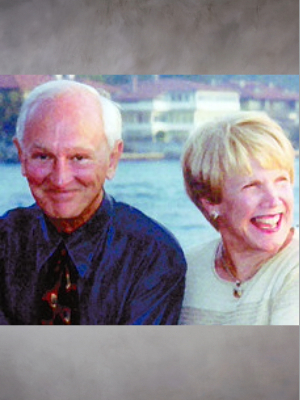
patrons
Larry Jones began working at the Coleman Company as an invoice audit clerk while attending Wichita University where he was student council president. Graduating cum laude from WU in 1953 with a degree in business administration, he would go on to a doctorate in business management from Harvard, teach at both of his alma maters (becoming a Distinguished Professor of Management at WSU), assume significant administrative positions at WSU, climb the corporate ladder at Coleman to be president and chief executive president in 1989, and become the republican candidate for Governor of Kansas. Larry was also appointed to the Kansas Board of Regents and served on the boards of directors for Cessna, Union Pacific and the Wichita Area Chamber of Commerce. A distinguished professorship was established in his name in Fairmount College of Liberal Arts and Sciences as a legacy gift from Union Pacific in 2008.
Anita Jones graduated magna cum laude in 1953 from the WU with a degree in English language and literature. A senior honor woman, she and Larry were married shortly after graduation. A longtime supporter of WSU School of Music, Anita served on the boards for the Wichita Symphony, Wichita Center for the Arts, WSU Fine Arts Advisory Board and the Alumni Association. In 1992, she was named a Woman of Distinction by the Wichita Area Girl Scouts Council. Her service to and financial support of the College of Fine Arts has been exhibited through nine years as a Music Associates board member, six years. as vice president and an original angel of WSU Summer Theater.
Both Society of 1895 Charter Members and the recipients of the Fairmount Founders Award in 1992, they established the Anita and Larry Jones Scholarship in Fairmount College of Liberal Arts and Sciences in 1993. Anita is a member of the Ulrich Salon Circle and has supported faculty fellowships to numerous faculty, including Sam Ramey’s faculty position in the opera program. Anita has made special gifts to the percussion program and orchestral programs. Both Larry and Anita have shown their commitment to excellence in WSU music by attending countless concerts, recitals, opera and stage productions.

alum
Eddie Martinez was born and raised in Newton, Kansas. He began his dance studies with Carol Iwasaki and attended Wichita State University where he received his BFA in Dance. Since then he has gone on to have an exceptionally diverse and extended international career, dancing with Tanztheater Wuppertal Pina Bausch.
After graduation from Wichita State, and as one of the first recipients of the Koch Cultural Trust Enabling Grants, Eddie’s professional journey took him to New York City, where he studied and danced for a number of years before joining the Tanztheater Wuppertal in 1995, one of the premier dance companies in the world. For the last twenty years, under the tutelage of and in collaboration with Pina Bausch, Eddie has been a part of some of the most groundbreaking works in dance. Pina Bausch, the artistic director of Tanztheater Wuppertal, was a pioneer in new directions for dance, incorporating a combination of poetic and everyday elements while emphasizing the intense relationship of one human being to another, expanding the choreography through singing and acting. It was this association that propelled Eddie into the forefront of the newly defined “Dance Theatre.”
Because of this association he has been a part of numerous honors given to Pina Bausch - the German Dance Prize in 1995, the Berlin Theatre Prize in1997, Japan's Praemium Imperiale in 1999, Monte Carlo's Nijinsky Prize, the Golden Mask in Moscow in 2005 and the Goethe Prize of the city of Frankfurt in 2008. Eddie performed in two pieces which won the Laurence Olivier Award 'Best New Dance Production' - Nelken (Carnations) and Das Frühlingsopfer (The Rite of Spring). Eddie was also featured in the award-winning Wim Wenders documentary Pina which premiered at the Berlin Film Festival in 2011 and was screened at the Wichita Center for the Arts, with Eddie present, in 2014.

alum
New York-based drummer and Grammy nominee Matt Wilson is one of today's most celebrated jazz artists. He is universally recognized for his musical and melodic drumming style as well as being a composer, bandleader, producer, impresario and teaching artist. Matt’s positive spirit, sense of humor and ability to explore a broad range of musical settings keeps him in constant demand. In addition, Matt’s dedication to jazz has helped establish him as a beloved world ambassador for the music, on and off the bandstand.
Matt leads the Matt Wilson Quartet, Arts and Crafts, Christmas Tree-O, Big Happy Family, Topsy Turvy and the Carl Sandburg Project. He has performed with many legends of music including Herbie Hancock, Dewey Redman, Andrew Hill, Wynton Marsalis, Carla Bley, Bobby Hutcherson, Charlie Haden, Lee Konitz, Elvis Costello, Paul Bley, Joanne Brackeen, Joe Lovano, John Scofield, Cedar Walton, Kenny Barron, John Zorn, Marshall Allen, Jane Ira Bloom, Michael Brecker, Pat Metheny, Bill Frisell and Hank Jones. Wilson has appeared on over 350 albums as a sideman, has released 12 recordings as a leader for Palmetto Records and has co-led 10 album projects.
Matt has been featured on the covers of Downbeat, JazzTimes, JazzIz, New York Jazz Record and Coda magazines and was voted #1 Rising Star Drummer in the Downbeat Critic’s Poll for five consecutive years. In both 2003 and 2011, he was voted Drummer of the Year by the Jazz Journalists Association and in 2015, he was named Drummer of the Year by the NYC Hot House Fan Decision Awards.

alum
International opera star and winner of the 2012 Grammy Award for Best Classical Vocal Solo, Kansas-born Mezzo Soprano Joyce DiDonato entrances audiences and critics alike across the globe, and has been proclaimed ‘perhaps the most potent female opera singer of her generation’ by The New Yorker. DiDonato has soared to the top of international opera as both a performer and a fierce arts advocate, gaining international prominence in operas by Rossini, Handel and Mozart, as well as through her wide-ranging, acclaimed discography. Her signature parts include the bel canto roles of Rossini, leading the Financial Times to declare her Elena La Donna del Lago, ‘simply the best singing I’ve heard in years’.
Joyce was born in Prairie Village, Kansas the sixth of seven children in a close-knit Irish-American family. She sang in choir and musicals in high school. At Wichita State University she studied vocal music education, initially more interested in teaching high school vocal music and musical theatre and did not become interested in opera until she saw a PBS televised broadcast of Don Giovanni. After graduating from WSU DiDonato pursued graduate studies in vocal performance at the Academy of Vocal Arts followed by the Houston Grand Opera's young artist program.
She began her professional career in 1998 singing with several regional opera companies in the United States, but it was her debut as Rosina in the Paris Opera’s Barber of Seville that launched her career internationally. Much in demand on the concert and recital circuit, DiDonato has held residencies at both Carnegie Hall and the Barbican Centre in London. Her Grammy-Award-winning recording Diva Divo comprises arias by male and female characters, celebrating the rich dramatic world of the mezzo-soprano. A retrospective of her first ten years of recordings entitled ReJoyce! was released last year. Other honors include the Gramophone Artist of the Year and Recital of the Year awards, a German Echo Klassik Award as Female Singer of the Year, and an induction into the Gramophone Hall of Fame.
Equally endearing and enduring, however, is her commitment to her craft and her willingness to impart it to the next generation of singers. Generous with her time and her wisdom, she has done numerous masterclasses throughout the United States in recent years. This is indicative of her open spirit and the Kansas work ethic she uses to approach all her endeavors.
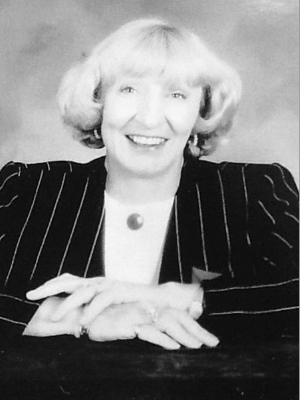
mentor
Jacquelyn Dillon was Director of String Studies and professor of music education and string pedagogy at Wichita State University. She is also a co-author of the Strictly Strings series and formerly served as national president of the American String Teachers Association. She is the recipient of a Lifetime Achievement award from the National School Orchestra Association, a Medal of Honor winner from the Midwest Clinic, a Lifetime Achievement award from American String Teachers Association, the Hall of Fame award from Kansas ASTA, and the “Music of the Heart” Award from the Kansas Music Educators Association. The Carnegie Foundation for the Advancement of Teaching selected her as Kansas Professor of the Year in 2008. She has served as President of the WSU Music Associates and the founding conductor of the Wichita Youth Symphony Chamber Players Orchestra. She is also a Hall of Fame awardee from the Kansas Music Educators Association and the Kansas Band Masters Association.
Ms. Dillon is a co-author of the Strictly Strings series and served as national president of the American String Teachers Association. As a cellist, Ms. Dillon has performed with symphonies in Wichita, Baton Rouge, and Oklahoma City. She is a frequent guest clinician and conductor with string festivals and state and national music educator events throughout the United States. She has presented guest professorships at nearly thirty-five universities during her tenure as a nationally known string pedagogue in the orchestra field.
Dillon began her teaching career in the Derby, Kan., public school system, where she founded an orchestra program. She repeated that success in Norman, Oklahoma. Drawing on those experiences, she then co-authored How to Design and Teach a Successful String and Orchestra Program, which became a key textbook for music educators. As a pedagogue, she’s prepared students from preschool to graduate school for careers as performers, conductors and educators. Dillon is a proven master of her discipline, and her influence is far-reaching. Says Ingri Fowler, an instrumental music educator, “I can't think of a time when, as an educator, I wasn't reading something she’d written. She’s been instrumental to string programs.”
Since those early days, Dillon went on to share her musical vision during nearly 3,000 professional appearances as a conductor, clinician and consultant in North America, Europe and Asia. She’s also held guest residencies at more than 50 universities. Dillon’s effectiveness as an educator is built on her ability to connect with people: “She’s capable of making you feel that you’re important, that she’s genuinely interested in what you’re doing, what you’re saying.”
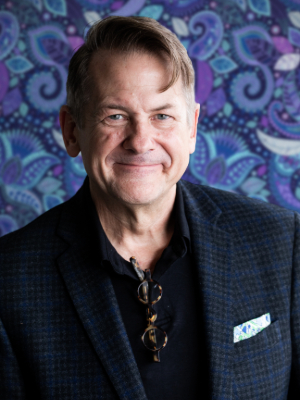
alum
Internationally renowned graphic designer and leading authority in corporate identity, Bill Gardner, is one of the most influential and sought-after graphic designers in the industry. His firm, Gardner Design, has built strong brands for hundreds of clients, from small businesses to international corporations.
Gardner grew up in Wichita. He worked as a magician to put himself through college, earning degrees in business and fine arts with an emphasis in graphic design from Wichita State University. Having long been fascinated with logos, Gardner followed his interests and instincts, first forming a design firm in 1983 with other designers before launching Gardner Design from a back room in his home in 1994. Now located in the Dockum Building in College Hill, his firm has done work for Kroger North American Convenience Stores, Wichita State University, Spirit AeroSystems, Cargill Corporation, Visit Wichita, Aspen Boutique and many others.
Gardner also was recently named a fellow in the American Institute of Graphic Artists, whose Wichita chapter he helped form in 1987, and served as the chapter’s first president.
Gardner started LogoLounge.com, an online catalog of more than 200,000 logos from around the world, in 2002. LogoLounge has become an international vehicle and a gathering point for designers, and was the catalyst to the best-selling book series of the same name. Gardner also wrote “Logo Creed: The Mystery, Magic and Method to Designing Great Logos,” a textbook for students and professionals alike.
Gardner spends time away from the office speaking nationally and internationally on the subject of corporate identity design, as well as with his wife, Andrea, and their daughter, Molly, who’s an interior architecture student at Kansas State University and active in Irish dance.

alum
Sonia Greteman serves as a respected and sought-out creative voice on a local and national level. Her long list of personal achievements include a special governor’s appointment, the Donna Sweet Humanitarian Award, American Advertising Federation of Wichita lifetime-achievement award, Wichita American Marketing Association marketer of the year, Wichita Media Hall of Fame, Wichita Eagle Top People to Watch, Wichita Business Journal Top 20 Women in Business, and Communication Artsdesign annual judge. Her office can scarcely hold all the Lucite that’s rained down on her through the years.
In 1989 she founded Greteman Group, an industry-leading agency known for concept-oriented creative driven by strategy. She has built a team that offers full marketing, advertising, PR, interactive and environmental support. Clients ¬span the globe – from Fortune 500 companies to start-up entrepreneurs. Leveraging its Air Capital location, Greteman Group serves the world’s leading aircraft manufacturers, flight support and aftermarket services. It also supports causes and clients close to home.
Sonia leads the firm as president and creative director. Whether the challenge is increasing a client’s marketshare, reframing an issue or connecting with new audiences, Sonia helps her team achieve maximum altitude. Challenging writers and designers. Spurring them to dig deeper, think smarter. She sets the agency’s direction, while empowering team members to spread their wings.
Whether Sonia is on a photo safari in Africa, an immersive tour of India or a behind-the-scene art tour of Japan, her reverence for other cultures and ideas enriches the agency’s creative product as well as feeds her own raging creative fires. She works tirelessly for her own community, serving on the advisory boards of the Wichita Art Museum and WSU Ulrich Museum of Art. She served 10 years as president of the City of Wichita’s Design Council and for many years on the boards of the Arts Council, Wichita Aero Club, WSU Center for Entrepreneurship and WSU Foundation National Advisory Council. Her pro bono creative has rallied support for Exploration Place, Raninbows United, Spay and Neuter Kansas, Kansas Aviation Museum, Roots & Shoots, CityArts, Positive Directions and more.
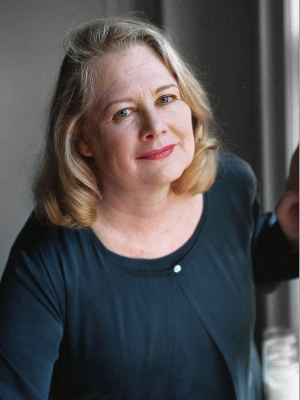
alum
Shirley Knight Hopkins is an internationally known stage, film, and television actress. She been given 21 lifetime achievement awards for her work and nominated for every major award in her long and distinguished career. Knight has been nominated twice for the Academy Award for Best Supporting Actress, in 1960 for The Dark at the Top of the Stairs and in 1962 for Sweet Bird of Youth, has won the Tony award in 1975 for Kennedy's Children plus two other nominations. She was nominated eight times for Emmy Awards (winning three).,She has also netted a Golden Globe and Volpi Cup for Best Actress for her role in the 1967 film Dutchman. She has received many honors from her home state of Kansas, including the Kansan of the Year award in 2000 and the Governor's Distinguished Artist Award in 2007.
Knight was born in Gossell, Kansas and spent her youth in Mitchell, Kansas and Lyons, Kansas. She showed multiple talents at an early age. By the time she was eight, she sang with an orchestra on radio and placed second in a state-wide talent show. At 14, she wrote a short story which was published in a national magazine. She attended Phillips University, Enid, Oklahoma, then Wichita State University, and has a Doctor of Fine Arts Degree from Lake Forest College. With dreams of becoming an actress, she went to Hollywood at the age of 20. A year later, she already had her first credit on the television series Matinee Theater. By the early 1960s, she garnered nation-wide exposure with Oscar nominations for her supporting role in the films The Dark at the Top of the Stairs (1960) and Sweet Bird of Youth (1962).
By mid-decade, Knight was well on her way to becoming a major film star, but she wasn't content with just having money and fame. She decided that the only way to become a real actress was to gain experience on the New York stage, and so, she left the film industry to study and work back East. Her Broadway career was successful and in 1966, Knight flew to England to try her luck in British theater.Also active in television, Knight has appeared in numerous mini-series and made-for-television films. She has received three Emmy Awards and has been nominated seven times, winning for her guest performances in the series thirtysomething and NYPD Blue. For her work in Indictment: The McMartin Trial, she received a Golden Globe and an Emmy Award.
A dedicated mother, Knight has spent much of her time caring for her two daughters, Kaitlin (an actress), and Sophie Hopkins (a writer) from her second marriage to British playwright/screenwriter husband John Hopkins.
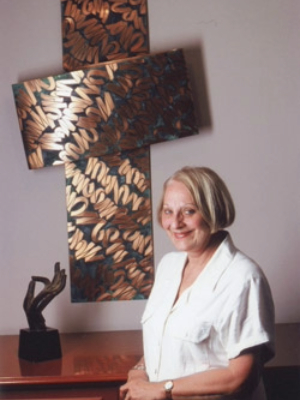
mentor
It wasn't unusual for people to find Mira Pajes Merriman formidable or even intimidating at first. An art history professor at Wichita State University for 30 years, she was a woman whose life and outlook were shaped by formidable circumstances: growing up in Poland at the outbreak of World War II, for instance, and fleeing with her family to the Soviet Union and, eventually, to the United States. She readily leveled criticism at blind ignorance and showed her contempt for acts of meanness, but at heart she was as soft, caring and as fun-loving as any person could be.
WSU students and dozens of colleagues and friends remember Dr. Merriman as one who could mesmerize in lecture halls and intimate gatherings alike with her description of Renaissance paintings and sculpture. She had a rare and special talent that made her students want to know more. To miss a class was to miss an event. This was her legacy to the students who flocked to her classes: the love of the story of Western civilization as told through great art.
Born in Poland in 1932, she fled with her family in 1939 to the Soviet Union, and two years later made the long journey to the United States, where her family settled in New York City. Those experiences were instrumental in shaping the person she became. But it was the seven years she lived abroad as a young woman that helped shape her love of art and culture. Her appreciation for art blossomed while a student at Columbia University, and it was at Columbia that Merriman met her husband, Jim. In 1966 they moved to Wichita, where she had been offered a position in the art history department and her husband in the English department. Dr. Merriman spent the next 30 years enlightening and entertaining students with her dramatic story-telling abilities and unmatched flair.
Outside the classroom, she had a love of nature and the outdoors and spent much time at her ranch in the Flint Hills. Lynda Beck, a friend, says Dr. Merriman had a style and panache that made being in the country an extraordinary experience. She rarely slowed down, even in later years. In her late 60s and 70s, Dr. Merriman traveled to Thailand, Turkey and Spain and — in a constant quest to discover the richness of life — tried everything from Flamenco dancing to snorkeling to belly dancing.

patrons
Dr. Lewis Miller was born in Washington Court House, Ohio, in 1876. A graduate of Northwestern University, he practiced dentistry in Lincoln, Neb., where he partnered with his brother operating local movie theaters. Dr. Miller and his wife, Selma, moved to Wichita in 1909, building the Princess Theater and the Palace, eventually opening the Miller Theatre in 1922. The Miller was considered to be the showcase of theaters, the “finest west of Chicago,” and was host to live stage shows that included Will Rogers and Charlie Chaplin.
Dr. and Mrs. Miller were devoted patrons of the arts, giving anonymous assistance to art students and programs. An artist herself, Mrs. Miller served on the board of directors of the Wichita Art Association from 1938-1961.
She was quoted as saying, “It is not what you have in worldly goods, but how you use it that counts most.”
Following Dr. Miller’s death in 1969, Wichita State University dedicated the Lewis and Selma Miller Concert Hall in the Duerksen Fine Arts Center in honor of their contribution of both time and means to community art and theater development. Upon Mrs. Miller’s passing in 1972, the Lewis and Selma Miller fund was established through their estate to ensure the development and furtherance of the WSU College of Fine Arts and the Ulrich Museum.
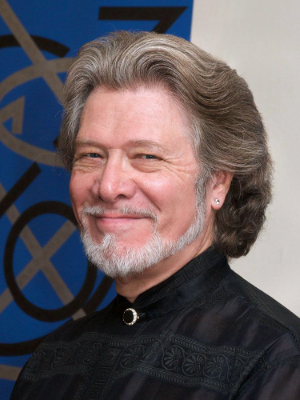
alum
New York-based drummer and Grammy nominee Matt Wilson is one of today's most celebrated jazz artists. He is universally recognized for his musical and melodic drumming style as well as being a composer, bandleader, producer, impresario and teaching artist. Matt’s positive spirit, sense of humor and ability to explore a broad range of musical settings keeps him in constant demand. In addition, Matt’s dedication to jazz has helped establish him as a beloved world ambassador for the music, on and off the bandstand.
Matt leads the Matt Wilson Quartet, Arts and Crafts, Christmas Tree-O, Big Happy Family, Topsy Turvy and the Carl Sandburg Project. He has performed with many legends of music including Herbie Hancock, Dewey Redman, Andrew Hill, Wynton Marsalis, Carla Bley, Bobby Hutcherson, Charlie Haden, Lee Konitz, Elvis Costello, Paul Bley, Joanne Brackeen, Joe Lovano, John Scofield, Cedar Walton, Kenny Barron, John Zorn, Marshall Allen, Jane Ira Bloom, Michael Brecker, Pat Metheny, Bill Frisell and Hank Jones. Wilson has appeared on over 350 albums as a sideman, has released 12 recordings as a leader for Palmetto Records and has co-led 10 album projects.
Matt has been featured on the covers of Downbeat, JazzTimes, JazzIz, New York Jazz Record and Coda magazines and was voted #1 Rising Star Drummer in the Downbeat Critic’s Poll for five consecutive years. In both 2003 and 2011, he was voted Drummer of the Year by the Jazz Journalists Association and in 2015, he was named Drummer of the Year by the NYC Hot House Fan Decision Awards.
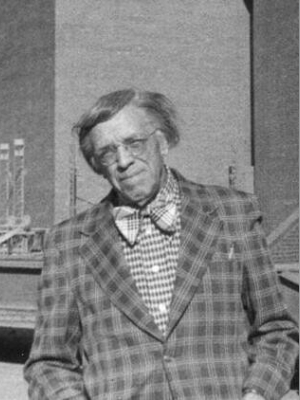
Patron
Mr. Edwin A. Ulrich loved having his name on the art museum at Wichita State University. Although his home was in Hyde Park, N.Y., he made regular trips to Wichita to see exhibitions and participate in events at the Ulrich Museum, which was named in his honor in 1974.
Ulrich built a successful business career as president of the Dutchess Oil Company of Hyde Park, New York. Among his passions outside the office were performing music and collecting the art of Frederick J. Waugh. In the early 1960s, Ulrich opened a museum dedicated to not only Frederick J. Waugh—but also his parents Samuel and Ida, and son Coulton Waugh—at his home in Hyde Park.
Mr. Ulrich was a Fairmount Society Life Member, a member of the President’s Club and the Society of 1895. In 1988, Mr. Ulrich received an honorary doctorate of humane letters from WSU. Over the course of many years, he donated more than 350 oil paintings, watercolors and drawings to the university; that’s in addition to his financial donations to WSU that totaled nearly $4 million.
When Mr. Ulrich was appointed a charter member of Wichita State’s senior board of governors after donating an outright $1.5 million to WSU, he said, “While I am not an alumnus of WSU, I feel a part of the activities of this university. I hope my gift can, in some measure, continue to promote the quality and excellence that I know… is paramount for the success of this fine institution.”
Mr. Ulrich died at his home in Hyde Park at age 97.
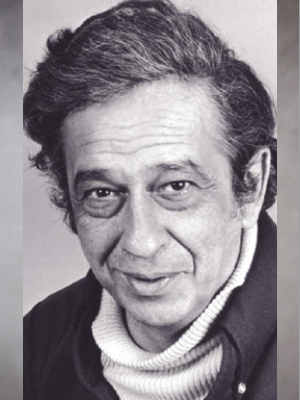
mentor
Dr. Richard Welsbacher is the namesake of Welsbacher Theater, WSU’s experimental theater located in the WSU Metroplex. He began his involvement with WSU in 1958. Two years later, he was appointed director of theatre. When theatre and dance were combined into the School of Performing Arts in 1987, Welsbacher was appointed Chair of the School. He continued to expand the program until he retired in 1991. During his thirty-year tenure as director of theatre, he directed more than 150 productions and performed more than 200 roles.
Dick, as his friends and students called him, was a Lieutenant junior grade in the Navy during World War II. After the war he received his B.A. In theatre from Denison University, then his M.A. in Theatre from the University of Denver. At that time he and his wife Betty toured the US for two years in a program called America in Story and Song.
Dick accepted a position at the University of Nebraska at Kearney. It was there that he discovered what he wanted to do with his life - teach. To facilitate that, he went to Ohio State for his Ph.D., after which he and his wife accepted positions at the University of Wichita, soon to be Wichita State. As chair, he developed the academic program and increased productions on the Main Stage and the Experimental Stage. He also developed the Readers Theatre program and a Summer Theatre with a repertoire each summer of six productions.
While he has accumulated numerous honors over the years, his proudest accomplishment was that of being a teacher. Students under his tutelage have gone on to careers in stage, film, and television, and over the years they have garnered multiple nominations and prestigious awards in all three areas. Returning alumni speak most highly of the level of professional habits he instilled in them as well as the many traditions he established, such as his annual reading of Dylan Thomas’ A Child’s Christmas in Wales during the holiday season.
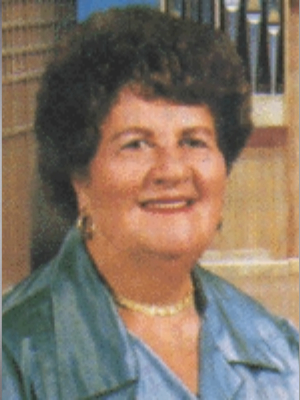
patron
Gladys Helena Gardner Wiedemann was born in Minneapolis, MN. Her father was a trombonist with the Minneapolis Orchestra and taught at the Minneapolis School of Music. She attended Minnesota University. K.T. Wiedemann and Gladys moved to Wichita in 1950 to be near business interests Mr. Wiedemann had acquired over the years in the Wichita area. In January of 1961, Mr. Wiedemann passed away of injuries suffered in an automobile accident near Leon.
Subsequent to that time, and prior to her death on February 6, 1991, Mrs. Wiedemann served as trustee of the K.T. Wiedemann Trust and as trustee and president of the K.T. Wiedemann Foundation, Inc. She became extremely active in the affairs of the Foundation and continued to support the Wiedemann's vision for a finer quality of life within Wichita and the state of Kansas. During Mrs. Wiedemann's tenure, the Foundation supported hundreds of charities in areas relating to the arts, health, children and youth, the elderly, and the disadvantaged. During that time, the Foundation contributed tens of millions of dollars to worthy causes primarily in Kansas.
As a result of her upbringing, Mrs. Wiedemann was especially fond of supporting the cultural arts in Wichita. She studied the violin for 14 years and was also an accomplished organist. Many believe, however, that her favorite project was her commission of the Marcussen concert organ located in Wiedemann Recital Hall at Wichita State University. The Great Marcussen Organ, a stunning pipe organ designed and built on-site by the legendary firm of Marcussen and Son of Denmark.
It was the first Marcussen instrument to be built on North America soil. The organ builders worked with architects to design a concert hall around the specifications of the organ to present the instrument in its ultimate acoustical glory. The building's superb acoustics keep it in demand as the primary recital and concert hall for the WSU School of Music, as well as drawing renowned organist from around the world for recitals and recording.